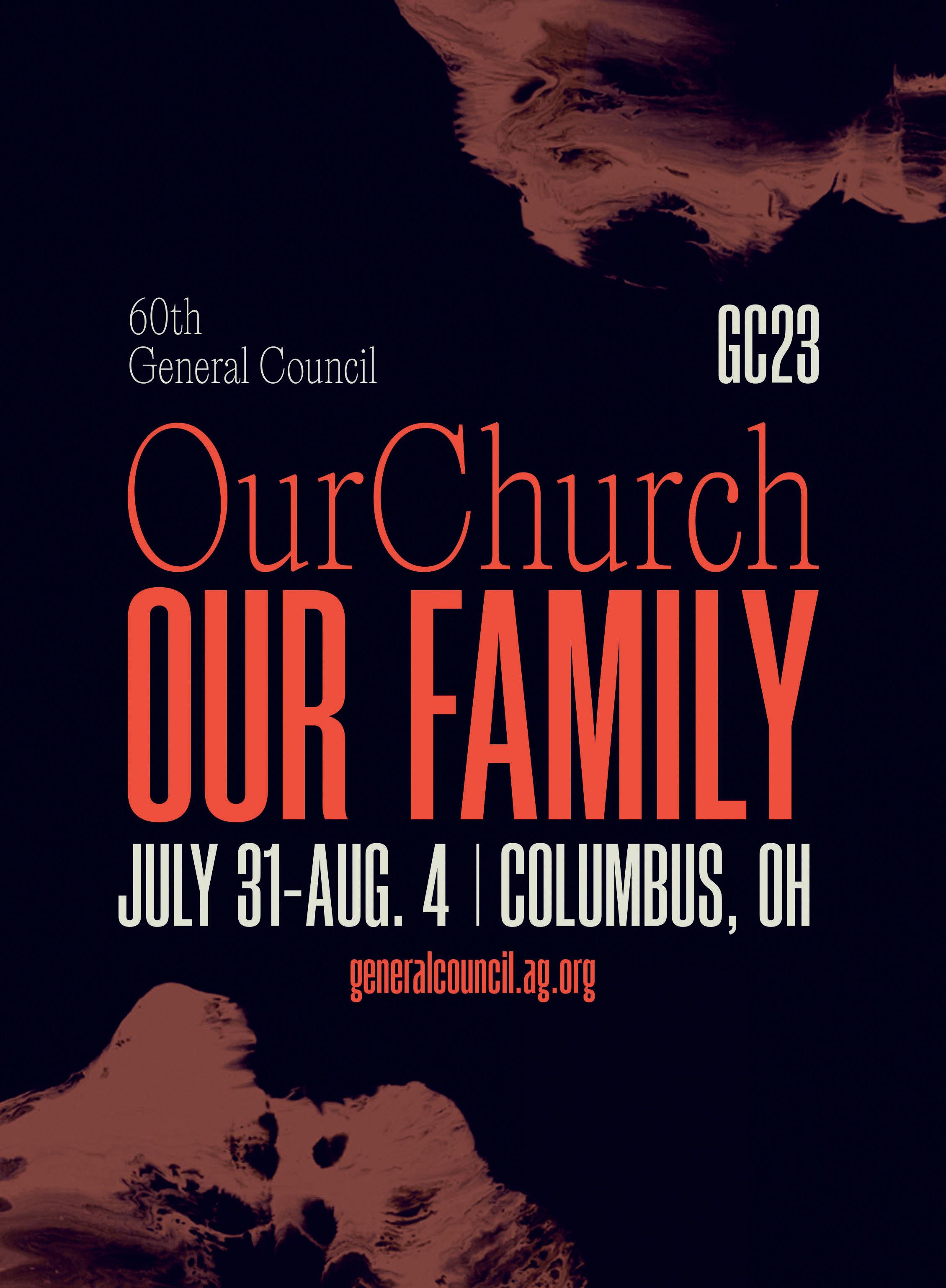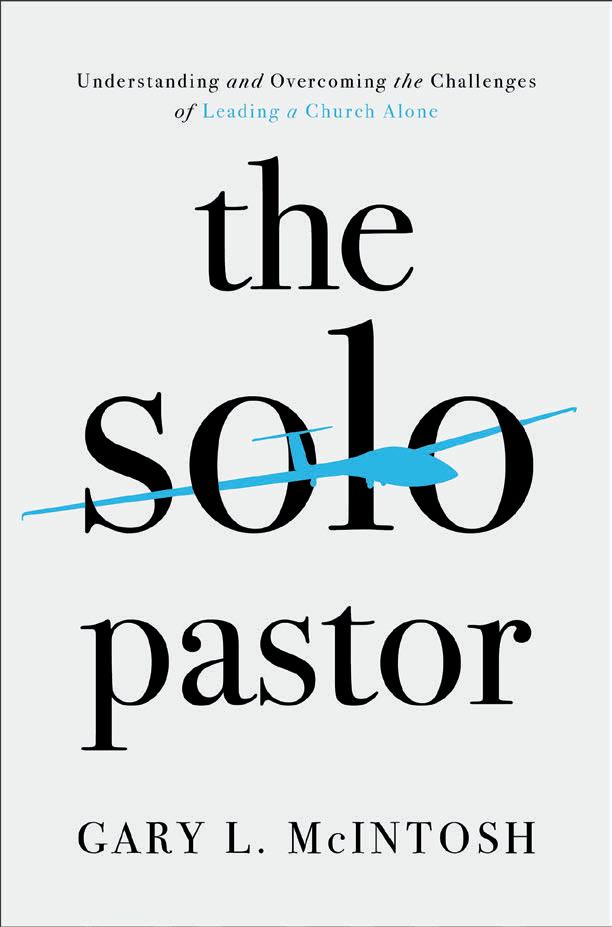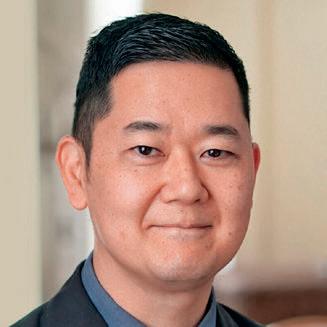RESPONDING TO CONTEMPO RARY C R ITIQUES IN LIGHT






















OF
The shape of leadership Spring 2 0 23 THE CHURCH AS A FARM TEAM 58 / WE ARE NOT IMMUNE 68
BIBLICAL MANDATES


















Acct. No. 390907 B ring iel h e h e h e ele r tingThirteen e r Bringing et e i h e le! Now Is The Time Now Is The Day Of Salvation r gener rt hel e ring e i ni e t e i h e le r n the rl le e t n ith e in the e h llenging n r heti ti e t er e n le e i h e le in r el n the n ti n An A ss e mblies o f God W orld Mission - International Ministries r r er n rtner hi hel r i e i n te ini tr te hing i i le hi n e ngeli ti tre h rt nitie ng the e i h e le I Will Bless Those Who Bless You Gen. 12:3










INFLUENCE MAGAZINE
1445 N. Boonville Avenue Springfield, MO 65802-1894
Influence magazine is published by The General Council of the Assemblies of God.
Publisher: Douglas E. Clay
Executive Editor: George P. Wood
Lead Editor: Christina Quick
Designers: Steve Lopez, Josh Thomassen
Advertising Coordinator: Ron Kopczick
CONTRIBUTORS
Stephen Blandino, Janet Boynes, Aaron Burke, Kathy Cannon, Mike Clarensau, Doug Clay, John Easter, Alan Johnson, Matthew D. Kim, Lynna Mooney, Kristi Northup, Shannon Polk, Steve Pulis, Darrin J. Rodgers, Nichole Schreiber, Ron Sellers, Chris Sonksen, Allen Tennison, Darnell K. Williams Sr., George P. Wood, John Zick
SPECIAL THANKS
Donna L. Barrett, Malcolm Burleigh, Douglas E. Clay, Wilfredo De Jesús, Rick DuBose, Greg Mundis
EDITORIAL or info or ueries, onta t editor in uen emaga ine om
ADVERTISING
Display rates available upon request. Contact advertising@influencemagazine.com. By accepting an advertisement, Influence does not endorse any advertiser or product. We reserve the right to reject advertisements not consistent with the magazine’s objectives.
Website: influencemagazine.com
Twitter: @theinfluencemag
Facebook: facebook.com/theinfluencemag
SUBSCRIPTIONS
To subscribe, go to influencemagazine.com or call 1.855.642.2011. Individual one-year subscriptions are $17. Bundle one-year subscriptions are $12 per subscription, for a minimum of six or more. International one-year subscriptions are $51, postage included. For additional subscription rates, contact subscribe@influencemagazine.com. Please send all other feedback, requests and questions to feedback@influencemagazine.com.
Copyright © 2023 by The General Council of the Assemblies of od, oon ille e , Springfield, M Permission required for reprints. All rights reserved.
All materials published herein including, but not limited to articles, photographs, images, and illustrations are protected by copyright and owned or controlled by Influence magazine of The General Council of the Assemblies of God.
All Scripture quotations, unless otherwise indicated, are taken from the Holy Bible, New International Version®, NIV®. Copyright ©1973, 1978, 1984, 2011 by Biblica, Inc.™ Used by permission of Zondervan (www.zondervan.com). All rights reserved worldwide. The “NIV” and “New International Version” are trademarks registered in the United States atent and rademar ffi e i li a, n
Influence magazine (USPS Publication: 0000-7180; ISSN: 2470-6795) is published quarterly by The General Council of the Assemblies of God (1445 N. Boonville Avenue, Springfield, MO 65802-1894). Periodicals postage paid at Springfield, Missouri, and at other mailing offices. Printed in the U.S.A.
Member of Evangelical Press Association

POSTMASTER
Send address changes to Influence maga ine oon ille enue
Springfield, MO 65802-1894
2 Spring 2023
The shape of leadership influencemagazine.com





























4 Spring 2023 CONTENTS Issue 42 | Spring 2023 68 76 The Church as a Farm Team Your next staff member might be closer than you think CHRIS SONKSEN 66 Equipping the Called JOHN ZICK We Are Not Immune Lessons from a mental health crisis MATTHEW D. KIM What We Believe About the Incarnation A series on the AG Statement of Fundamental Truths ALLEN TENNISON Responding to contemporary critiques in light of biblical mandates JOHN EASTER and ALAN JOHNSON 58 48
The Hinge of Christianity
Resurrection, preaching, and faith | GEORGE P. WOOD

Designed for Servant Leadership
Advice for team leaders and team members | DOUG CLAY

The Ten Commandments and Leadership

A 10-week study for leadership teams | STEPHEN BLANDINO


Called Out
Finding freedom from same-sex attraction | JANET BOYNES

LEADERSHIP
Telling the AG’s Story
John W. Kennedy reflects on his career in journalism | GEORGE P. WOOD
Give It a Rest
Finding margin in life and ministry | DARNELL K. WILLIAMS SR.

The Perfectly Imperfect Family
Living and leading with authenticity | KATHY CANNON

Called to Equip
Helping people discover and use their spiritual gifts | AARON BURKE


Watch Your Mouth
Three questions to consider when preaching | SHANNON POLK
Giving Begets Giving
What a department store Santa got right about generosity | RON SELLERS

Pentecostals, Pacifism, and Persecution
Wartime threats to American religious liberty | DARRIN J. RODGERS
• How to Lead a Church Alone
• The Church’s Power Train | GEORGE P. WOOD
Spring 2023 5
FROM THE EDITOR FROM THE HEART OF THE GS MAKE IT COUNT THIS IS MY STORY 8 10 110 128
DEPARTMENTS
PROFILE SELF HOME PRACTICE ETHICS INSIGHTS HISTORY REVIEWS 16 20 24 28 32 36 40 44






6 Spring 2023 podcasts Check out our influencemagazine.com/podcast MINISTRY Q&A PREACHING WORSHIP KIDS YOUTH ADULTS 86 90 94 98 102 106 Reaching Secular People A Q&A with Shawn G. Pray Before You Preach Petitions that should precede every sermon | NICHOLE SCHREIBER The Sound (Theology) of Music Choosing songs that make disciples | KRISTI NORTHUP How Inclusive Is Your Kids’ Ministry? Five keys to welcoming every child | LYNNA MOONEY The Long Game in Youth Ministry Equipping students for a lifetime of faith | STEVE PULIS Measuring Up How to use church statistics more effectively | MIKE CLARENSAU More than a magazine

The Hinge of Christianity
By GEORGE P. WOOD
The Resurrection is the hinge on which Christianity turns.

“If Christ has not been raised, our preaching is useless and so is your faith,” the apostle Paul wrote in 1 Corinthians 15:14. Why would our preaching be useless? Because we would be “false witnesses about God” (verse 15). Why would our faith be useless? Because we would still be in our sins (verse 17).
The words preaching and faith in these verses point to the missional and existential dimensions of Christianity, respectively.
Christianity’s mission is proclaiming the gospel. “By this gospel you are saved,” Paul wrote in verse . e then identified the foundation of the gospel “Christ died for our sins according to the Scriptures, … he was raised on the third day according to the Scriptures” (verses 3–4).
The Old Testament prophesied Christ’s death and resurrection, but Jesus’ contemporaries saw the events happen. Paul used the phrase “he appeared to” four times in verses 5–8. The phrase precedes an impressive list of eyewitnesses: Cephas (Peter), the Twelve, more than 500 disciples, James and the other apostles, and finally aul himself.
theist ichard awkins has defined faith as “belief in spite of, even perhaps because of, the lack of evidence.” Paul agrees with Dawkins that if the Resurrection didn’t happen, there is no point believing in Jesus. The door slams shut on Christianity if the body of Christ lies moldering in a grave.
ut neither aul nor any other Christian defines faith as Dawkins does. On the contrary, in 1 Corinthians 15, faith is belief that Christ rose from the dead on the basis of eyewitness testimony.
Faith is more than belief, however. “By this gospel you are saved, if you hold firmly to the word I preached to you,” Paul wrote in verse 2. Faith includes belief in a person. That’s trust. And it requires belief through tough times. That’s allegiance.
Belief, trust, and allegiance are the existential dimensions of Christianity. They’re how we should respond to the gospel. And given the evidence, such a response is warranted.
In “Seven Stanzas at Easter,” John Updike took liberal theology to task for a rming the symbolism of the Resurrection while denying its historicity: Let us not mock God with metaphor, analogy, sidestepping, transcendence; making of the event a parable, a sign painted in the faded credulity of earlier ages: let us walk through the door.
For if Christ is risen — if He is risen indeed — the door to eternal life swings open wide! This is good news! Let’s share it with others!
GEORGE P. WOOD is executive editor of Influence magazine.

THE EDITOR 8 Spring 2023
FROM
Timeless


Since it first appeared in England in 1927, the so-called golden book of Oswald Chambers has traversed languages and countries and denominations to become one of the bestselling daily devotionals of all time.



New and longtime believers will strengthen their faith with this Modern Classic Edition that is a new and approachable revision of Chamber’s masterwork that retains the timeless wisdom and spiritual dynamism of the original.
This new authorized edition of Chambers’s masterwork:


• Is a 90-day gift devotional
• The perfect present for graduation and Father’s Day
Full 365-Day Modern Classic Edition coming Fall 2023






• Is from the My Utmost line of products with millions of copies sold


Order your copy today!

wisdom in a modern edition— perfect for gift-giving!
Designed for Servant Leadership
Advice for team leaders and team members
By DOUG CLAY
Annually, I pray about a word or phrase I want the ssemblies of od national o ce to use to enhance our culture of ministry during the year. In past years, that phrase has been “Over the Top,” “Plus One,” “Ready … Fully Prepared,” and “Accelerate.” In 2023, it is “Designed for Servant Leadership.”
Robert K. Greenleaf coined the term “servant leadership” in his 1970 essay “The Servant as Leader.” Long before him, however, Jesus Christ laid its foundation when He said, “For even the Son of Man did not come to be served, but to serve, and to give his life as a ransom for many” (Mark 10:45).
s servant leaders, we are servants first. e focus on the needs of others, especially team members, before we consider our own needs. We acknowledge other people’s perspectives; give them the support they need to meet their goals, whether professional or personal; involve them in decisions where appropriate; and build a sense of community.
Servant leadership results in higher engagement, more trust, and stronger relationships within teams. It also leads to increased innovation.
What would it look like if we practiced servant leadership in our churches and ministry teams? Let me answer that question from two perspectives: team leaders and team members.

Team Leaders
Team leaders manage and supervise others. Lead pastors, staff pastors with direct reports, and even key ministry volunteers may lead teams. They set the tone and create the culture of servant leadership among their team members.
The primary way to do this is through personal example. When Jesus called the disciples, He didn’t say, “Hear me out,” as if sitting through a training lecture is su cient. e said, ollow me Mark . esus entire life e emplified the kind of life He wanted His disciples to lead.
10 Spring 2023
FROM THE HEART OF THE GS
Servant leadership results in higher engagement, more trust, and stronger relationships within teams.
What does servant leadership look like for team leaders Consider the following five characteristics
1. Listening. Listening is more than just hearing in the physical sense. Listening is a spiritual discipline. It is the kind of attentiveness Jesus had in mind when He said, “Whoever has ears to hear, let them hear” (Mark 4:9).
For ministry teams, listening is paying attention both to what team members say and to what the Spirit is saying at the same time
2. Empathy. Servant leaders take into consideration the well-being of their team members. Being empathetic means we enter into their experiences and consider their perspectives. We know what makes them tick and what ticks them off.
It has been said that talent wins games, but teamwork wins championships. Empathy is what makes teams work.
3. Learning. Leaders constantly ask themselves and their team members, “How can we do it better?”
I love what Roy T. Bennett wrote in The Light in the Heart:
Don’t just learn, experience.
Don’t just read, absorb.
Don’t just change, transform.
Don’t just relate, advocate.
Don’t just promise, prove.
Don’t just criticize, encourage.
Don’t just think, ponder.
Don’t just take, give.
Don’t just see, feel.
Don’t just dream, do.
Don’t just hear, listen.
Don’t just talk, act.
Don’t just show, tell.
Don’t just exist, live.
Servant leaders are constant learners, moving beyond basic to become something better

4. Stewardship. Here’s a truth all leaders need to remember: Your assignment today will be someone else’s tomorrow. Wisdom requires leaders to take the long view and prepare their successors for success.
As Paul put it in 2 Timothy 2:2: “And the things you have heard me say in the presence of many witnesses entrust to reliable people who will also be ualified to teach others. aul stewarded four generations of leadership in this one verse!
5. Security. Team leaders need to cultivate a sense of emotional security that allows others to shine, whether they’re our peers or the team members we lead. According to Proverbs 3:34, God “has no use for conceited people, but shows favor to those who are humble” (GNT). As leaders, are we able to set aside our egos for the good of the team? For the good of the whole ministry?
Team Members
Servant leadership isn’t just for team leaders, however. All Christians are called to steward their influence in ways that best serve others.
As Paul put it in Philippians 2:3–4, “Do nothing out of selfish ambition or vain conceit. ather, in humility value others above yourselves, not looking
Spring 2023 11
to your own interests but each of you to the interests of the others.”
What would it look like if team members practiced servant leadership Consider another five characteristics:
1. Honor. In Romans 12:10, Paul wrote, “Love one another with brotherly affection. Outdo one another in showing honor” (ESV, emphasis added). hat kind of outdoing defines the attitude of a servant leader.
Albert Einstein once said, “I speak to everyone the same way, whether he is a garbage man or the president of the university.”
Einstein’s statement encapsulates how to honor others before yourself. When we regard others as genuinely important, no matter their positions in life, we demonstrate genuine respect.
2. Ethics. Here, we’re talking about the moral principles governing character and conduct. As servant leaders, we should always choose what is right over what is personally advantageous.
Proverbs 22:1 says, “A good name is more desirable than great riches; to be esteemed is better than silver or gold.”
Here’s my paraphrase of that verse: There’s no price you can pay for integrity, but a lack of integrity can be extremely costly.
As team members, our ethics shine when we are honest in our reporting, follow through on our promises, and practice a good work ethic.
3. Empowerment. President Harry S. Truman said, “It is amazing what you can accomplish if you do not care who gets the credit.” That’s empowerment — setting up others to succeed.
Empowering is what team leaders do, of course, but team members can empower one another, too. We grow our empowerment skills when we acknowledge everyone’s contributions, give and receive honest feedback, and make room for others to shine.
4. People. Gospel ministry is all about people. The Church is a people business, not a widget factory. Loving people is what we do.
Our job, in this regard, is simply following Jesus’
example. “Having loved his own who were in the world, he loved them to the end” (John 13:1, emphasis added). We begin and end by loving people, and love for people characterizes how we treat them in between.
People are not a means to an end in ministry. They are the whole reason we do what we do.
So, how do we love the people we work with on ministry teams? We see the good in them, pray with them, show patience to them, and love enough to be honest with them.
5. Humility. C. . ewis defined humility this way: “Humility is not thinking less of yourself; it’s thinking of yourself less.” It’s not self-deprecation or a focus on personal shortcomings. Rather, it’s a focus on and concern for the world around you. hat a valuable lesson on influence ride is poison to a team. It is repellant to people you want to influence.
First Peter 3:8 says, “Finally, all of you, be likeminded, be sympathetic, love one another, be compassionate and humble.”
Such humility starts as a mindset before it becomes a practice. Whether you’re a team leader or a team member, your influence on others will always be stunted if you’re not growing in humility.
In some business circles, servant leadership devolves into a leadership style or technique for getting others to do what you want them to do.
That’s not what it should be in the Church, however. Rather, it’s the way of Jesus, and therefore the way we live and serve others as His followers. This year, whether we’re team leaders or team members, let s remember we re servants first DOUG
CLAY is general superintendent of the Assemblies
of God USA.

12 Spring 2023
PRINCIPAL/TEACHER
M. Ed. Educational Leadership

M. Ed. Curriculum & Instruction


FOR YOUR CALLING
PRESIDENT, CEO
M.A. Organizational Leadership
Master of Business Administration
PROFESSOR
Doctor of Ministry
M.A. History
M.A. Bible & Theology
PASTOR
Master of Theological Studies
Master of Divinity
M.A. Children & Family Ministries
PSYCHOLOGIST/ COUNSELOR
M.S. Clinical Psychology
M.S. Clinical Mental Health Counseling


M. Ed. School Counseling
FIND THE DEGREE TO UNLOCK YOUR POTENTIAL AT WWW.SAGU.EDU/HGS




ACCREDITED MASTER’S DEGREES AVAILABLE IN


MINISTRY | BUSINESS | EDUCATION | THEOLOGY | LEADERSHIP
| PSYCHOLOGY



















Telling the AG’s Story o
e e y re ect o i c reer i o r li m
By GEORGE P. WOOD
“Journalism is the first rough draft of history, uipped hilip raham, legendary publisher of The Washington Post
If raham is right, then ohn . ennedy has been drafting ssemblies of od history for nearly a uarter century. ennedy retires in pril. ver the course of his career, he has written appro i mately , stories.
fter catching the writing bug in high school, ennedy enrolled in the acclaimed Missouri chool of ournalism at the niversity of Missouri in Columbia.
ollowing graduation in , ennedy went
to work for his hometown newspaper in airfield, Iowa. hat paper fired ennedy in because he started a right to life group in response to his pas tor s preaching. ennedy believes the termination was financially motivated. prominent abortion provider was a major local advertiser, and enne dy s pro life activism threatened the newspaper s revenue stream.
ennedy moved to acramento, California, where he worked first as a copy editor and then as religion editor for one of the city s leading newspapers.
rom , ennedy served as news editor at Christianity Today, evangelicalism s flagship mag a ine, based in Carol tream, Illinois.
he ssemblies of od s Pentecostal Evangel then recruited ennedy to write and edit its monthly world missions issue in pringfield, Missouri. ennedy s role at the Evangel soon e panded, and he spent years as news editor.
ince , ennedy has been news editor of ews, the ellowship s o cial news source. ews publishes at least one story about adherents, churches, and ministries daily, Monday through riday.

16 Spring 2023 LEADERSHIP | PROFILE
oes ennedy have a favorite type of story he ones that give me the most satisfaction are about resilience and redemption, he says.
s an e ample, ennedy cites ddicted to e , a cover story he wrote for Christianity Today. He interviewed Christian men who struggle with se ual addiction, a common problem in the . . he men shared their e periences of deliverance and recov ery through Christ.

ther stories ennedy has written focus on fos ter care and adoption, emotional resilience after trauma, and recovery from illness, tragedy, or moral failure. he before and after power of the gospel runs like a thread through all these articles. hat s what the ible is about, ennedy says. It s telling people s transformative stories.
uch stories encourage readers and elicit empa thy in them.

e all need hope, and those testimonies pro vide that, ennedy says. If people who are in the pews can be encouraged by someone else s story, I think that s a good thing.
tories also capture the perspectives of people from different backgrounds. ennedy jokingly calls himself an old white guy. onetheless, he believes writing and reading about the diverse
e periences of Christian women and racial and ethnic minorities has been eye opening.
I think it s important that we tell everybody s story, ennedy says.
ot all stories involve good news, however. he hardest stories ennedy has written involved the opposite.
arly in ennedy s career, for e ample, a mar ried couple lost their lives in a house fire. hen his editor sent him to interview the couple s daughter, ennedy uickly learned reporting on tragedies was part of the job.
s a religion journalist, ennedy also discovered covering scandals in Christian institutions could put reporters in the bull s eye of criticism. hile at Christianity Today, he investigated an evan gelical university that was million in debt. whistleblower claimed the school wasn t honoring financial grants to students or paying its employees.
ne night, as ennedy was interviewing witness es, he received a phone call from the university s well known founder.
I hear you ve been sneaking around town like a a i spy, that man said.
ennedy published an evenhanded story about the school s financial di culties. s a result, a pair
Spring 2023 17
‘‘ What a preacher does with a sermon and what I try to do with an article is really the same thing. We’re looking for a connecting point to our audience, helping them relate to the person we’re talking or writing about. ’’
— John W. Kennedy
of wealthy donors helped the school substantially pay down its debt and get out of arrears with employees.
Truthful reporting can hurt in the short term, it seems, but its longterm effects are positive.
Are there lessons pastors can learn from journalists? ennedy believes so.
he first has to do with leveraging influence.
Karl Barth, the great Swiss theologian, once said, “Take your Bible and take your newspaper, and read both. But interpret newspapers from your Bible.”
ennedy agrees with arth, even though many people now turn to social media more than newspapers for information.
“A pastor needs to be aware of what’s going on in culture in order to be relevant to congregants, Kennedy says.
owever, he is concerned that too much focus on contemporary events in preaching can supplant the primacy of the gospel.
Referring to hot-button issues, Kennedy says, “If we stay on one topic too much as a ministry leader, we are in danger of losing our influence.
The second lesson has to do with storytelling.
“What a preacher does with a sermon and what I try to do with an article is really the same thing,” Kennedy says. “We’re looking for a connecting point to our audience, helping them relate to the person we’re talking or writing about.”
e notes that people find the ible relatable because it tells stories of flawed individuals.
“We can identify with them,” Kennedy says.
The third lesson has to do with how pastors prepare laypeople for ordinary living.
ennedy is not a vocational minister, but he has been involved with church his entire life. is father was a resbyterian minister. ver the years, ennedy has served churches he attended in a variety of
roles, from Sunday School teacher to board member. nce, during a pastoral transition, he even preached every third unday until the congregation elected a new pastor.
Yet Kennedy has always seen his work outside the church as a form of ministry as well. nd he believes pastors need to prepare church members to live Christianly in their secular vocations.
“Scripture says that we are all ministers,” Kennedy says. o, to view a job such as journalism as a ministry is valid.
During his career, Kennedy has garnered multiple writing awards from the vangelical ress Association.
“John has been a catalyst for writing stories that have blessed the body of Christ around the world, says AG General Superintendent Doug Clay. “He’s a great gift.”
 GEORGE P. WOOD is executive editor of Influence magazine.
GEORGE P. WOOD is executive editor of Influence magazine.



18 Spring 2023
Above, left: Reporting for his hometown newspaper in airfield, o a Right: n iananmen S uare, ei ing, hina, hile on assignment for the Pentecostal Evangel Left: ith hildren at an S home in usten urg, South fri a, as an Evangel writer.

Give It a Rest i i m r i i li e mi i try
By DARNELL K. WILLIAMS SR.
My family and I were looking forward to our upcoming vacation together. s we packed for the much needed time away, one phone call threatened to ruin all our plans.
crisis had developed that caused me to rethink the timing of the trip. I discussed it with my wife, Charlene, and we agreed this issue had the poten tial to become e plosive. e decided to cancel our vacation.
ust as we were about to break the sad news to our year old son, I sensed a nudge from the oly pirit. I felt compelled to reach out to a trusted ministry friend who had always been a source of wisdom.
My friend challenged me with these words rust od with the church. on t cancel your time of rest. It would disappoint your wife and break your son s heart.
lthough he advised checking in with our church s leaders while we were away, my friend encouraged me to go and enjoy the vacation. I fol lowed this advice and never regretted it. he crisis dissipated, and our family made some wonderful memories on that trip.
he pirit s intervention reminded me it is the

ord s Church, not ours. ur job is to trust im in all things. o why is it so hard to step away, even for a short time
Ministry can feel a bit like a basketball game. un ning is the normal pace. hen things slow down, tension remains high as everyone waits for the ne t play to develop. ven when you get a chance to sit down and catch your breath, you stay focused on the game, anticipating the moment when you return and do it all again.
uch a routine is e hausting. nd unless we proactively practice spiritual disciplines, it is unsustainable.
Creating margin for rest and renewal is essential. More than that, it s a biblical principle.



s church leaders, we know these things. et there often e ists a chasm between what we know


20 Spring 2023
LEADERSHIP | SELF
and what we do. s a result, many ministers are on the verge of burnout or worse.
uthor ohn Ma well said, ood habits are hard to form, hard to maintain, and easy to break. ad habits are easy to form, easy to maintain, and hard to break.
If we are not intentional, the bad habits of neglecting rest, self care, and family time can and will affect us.
A Priority

ppointments, meetings, emails, and endless demands for pastoral care consume much of our time in ministry. ome weeks, it can be hard to s uee e in a few hours for sermon preparation, much less time to rela and unwind.
tephen Covey, author of The 7 Habits of ighl ecti e eople, famously provided a visual illustration of the importance of establish ing priorities. Covey took an empty container and challenged volunteers to fill it with water, sand, peb bles, stones, and large rocks. hose who put in the smaller items first found there was little room for anything else.
Covey demonstrated the solution, placing the big rocks first, followed by the stones, pebbles and sand. inally, he added the water, which seeped through the sand and into the remaining small spaces.



s Covey e plained, the large rocks symboli e those things that are most important. ime with od and family are large rocks. o are other essen tials, including rest. e can then fill in the gaps with items that are less urgent.
pproaching time in this way ensures our sched ules will reflect proper values, needs, and priorities.
A Discipline
here is a false and dangerous notion in ministry that the pace of work indicates the depth of our spir ituality. I ve heard pastors say things like, I ll rest when I die, or, I d rather wear out for od than rust out for the devil.
I have also encountered this one a few times he devil never takes a day off, so I won t either. My response is, Maybe you need a better role model. aking a break does not mean we are la y or unspiritual. In fact, we need to embrace rest as a spiritual discipline.
od rested during the creation account and insti tuted a time of rest for is people enesis odus . esus e emplified the importance of rest by honoring the abbath and practicing soli tude and retreat uke .
here are a number of ways to make rest a regu lar discipline. Consider starting with the following four
1. Maintain daily devotions. pend intimate time with the ord through worship, ible engage ment, journaling, and prayer.
2. Observe a weekly sabbath. or most min isters, unday is not a day of rest. et aside a day
Spring 2023 21
There is a false and dangerous notion in ministry that the pace of work indicates the depth of our spirituality.
in the week as a sabbath. edicate this day to physical rest, emotional renewal, and relational reconnection.
3. Practice monthly disciplines. ach month, focus on engaging a specific spiritual discipline. ray about it during your uiet times with od. sk the oly pirit to form Christ s character in you throughout the year.
A Necessity
here may be seasons when creating margin seems impossible. or e ample, the congregation may be working through a prolonged crisis. r you may be dealing with health issues, personal financial pres sures, or family di culties.

et even during such times perhaps especiall during such times you need rest. Ignoring this necessity will only compound your problems.
ome ministry situations can make taking a week off di cult. or e ample, bivocational ministers, solo pastors, and leaders with little support may be hesitant to step away from the pulpit ever.
his re uires innovative thinking. ake steps to develop ministry partners who can help share the responsibilities of the pastorate. Create a long term plan for e uipping lay leaders. orm relationships with other ministers in the region. sk network leaders or even itinerating missionaries to fill in for you while you re away.
Ministry often attracts people who are willing to make sacrifices for the good of others. s admi rable as this altruism may be, it can turn into an unhealthy pattern of work life imbalance and self neglect.
on t make the mistake of sacrificing your health, family, relationships, and ministry to a well meaning but destructive commitment to non stop activity.
emember the words of the apostle aul to his young prot g imothy atch your life and doc trine closely. ersevere in them, because if you do, you will save both yourself and your hearers imothy .
4. Schedule vacations every six to 12 months. It can be di cult for pastors to take a vacation with out feeling guilty. hen we consider our workload, it can seem like getting away is the wrong thing to do.
owever, we will be better e uipped to minister effectively after taking some time to decompress and recharge. nd if we re intentional in our plan ning, we can schedule vacations during slower or less demanding times of the church year.
DARNELL K. WILLIAMS SR., D.Min., is associate professor of pastoral studies at North Central University’s College of Church Leadership in Minneapolis, vice president of the National Black Fellowship of the Assemblies of God, and an AG executive presbyter.

22 Spring 2023
Don’t make the mistake of sa rifi ing our health, family, relationships, and ministry to a well-meaning but destructive commitment to nonstop activity.



van g uard . ed u Orange Count y, CA • Onlin e PAVIN G TH E WAY F OR W ORLD -C HAN GER S Acade mi c E xcel l ence S i nce 1920
The Perfectly Imperfect Family ivi le i it t e ticity
By KATHY CANNON
Sometimes it seems there are demonic forces assigned to disrupt the families of pastors on aturday nights and unday mornings. flat tire, a marital spat, an argumenta tive teenager, or a screaming toddler can be enough to make us uestion our calling before we even leave the driveway.
e can smile while stepping onto a platform to preach. ut when the service ends and the adrena line stops pumping, it s back to life in a fallen world.
24 Spring 2023 LEADERSHIP | HOME
ack to household financial worries. ack to spilled milk and clogged drains. ack to the hard work of marriage and parenting. ack to daily reali ties that are often less than ideal.
Is this the way ministry is supposed to look irst
imothy sets a high bar for church lead ers. mong other things, leaders should be above reproach, faithful, temperate, self controlled, and respectable.
inally, aul said leaders must manage their fam ilies well and see that their children are obedient doing all this in a manner worthy of full respect.
If only I had a uarter for every time one of our si children has disobeyed my husband or me during our years of parenting. s the old joke goes, ministry would be so simple if it weren t for people. nd some days, those people are my own family members.
f course, it s not just them. I wish I could say I ve never raised my voice, missed an appointment, or dropped the ball on something that was important to my husband or kids. In such moments, I hardly feel above reproach.
here are times when it seems as though my list of failures is longer than aul s list of ual ifications. arents commonly wrestle with feelings of guilt, but ministry can add another layer of impossible e pectations.
e have a big family, built through foster care and adop tion. ith a mi of races, ethnicities, histories, struggles, and traumas, our home life is any thing but typical. ur kids have needs and ways of e pressing themselves that are challenging at times. e depend on od each day and often lean on a team of e perts and therapists.
lthough it has been a rewarding journey, there are days when the strain is overwhelming. I ve sat in my church o ce wondering how I could serve as an e ample to od s people while feeling like a poor, broken imitation. o paraphrase imothy , if I don t know how to manage my own household, how can I take care of od s church
It might seem like the biblical standard for min istry families is nothing less than perfection, but we need to keep this te t in proper perspective. aul s purpose was not to uphold marital bliss and paren tal success as litmus tests for ministers.
In fact, aul was unmarried and otherwise e alted the single life Corinthians . irtue lists like the one in imothy were not about the understood e ceptions, nor were they e haustive.
o what should we do when the desire for a per ect life collides with real life
Pride and Perfection
My reality often deviates from the flawless images and shining reports I see other ministers posting on social media.
In a world of carefully curated personas, not only can I perceive my shortcomings, but I assume everyone else can as well. I m tempted to cover up the struggles and put on an act. fter all, my credi bility is on the line, right
rong. It s my pride on the line and that can be a slippery slope. If I m willing to sacrifice appropriate transparency for a public performance, I may soon sacrifice personal integrity for public a rmation.
aul s leadership concerns come into sharper view as his letter continues. In imothy , aul wrote, lthough I hope to come to you soon, I m writing you these instructions so that, if I am delayed, you will know how people ought to con duct themselves in od s household, which is the church of the living od, the pillar and foundation of the truth.
elling imothy to safeguard the gospel, aul
Spring 2023 25
f m illing to sa rifi e appropriate transparency for a public performance, ma soon sa rifi e personal integrit for pu li affirmation
warned him of troublemakers, false teachers, and hypocritical liars who would lead some people away from od s truth .
In today s world, there are platforms every where, but truth can be harder to find. I am not the only one comparing my marriage, children, kitchen, and even spirituality to the influencers of this world.

too. o if I don t hang out a lot after service, or if I m not smiling as much as usual, please know we love you, and we appreciate your prayers while we re on this journey.
hat morning, I felt dis ualified walking up to the platform, but od reminded me once again e ualifies the called. he oly pirit used the ord and my time of ser mon study to minister to everyone in that room, including me. nd my hon esty allowed our church to grow as a place of whole ness and healing.
ur congregants do not need contrived per fection, and neither do our families. hey need authentic leaders who are men and women of respect and honesty.
Communities need pastors people will look at and say, I can begin to believe in esus, because I believe you.
his is the kind of character aul described. his is the type of leader who represents od s household well.
Getting Real
ne unday, our family was dealing with multiple crises we could have kept hidden. nly a few close friends knew the details of what I wanted to sweep under the proverbial rug.
My smile could have been plastered on until the people were gone and I was left alone in the sanctuary. ut I had to be real with od about my uestions, pain, and an iety.
o instead of faking anything, I decided to be real with my congregation as well. I didn t give any details they didn t need to know, and I was careful not to tell anyone else s story or overshare.
I simply said, ur family is dealing with a lot right now. It s hard. nd since you are all real people and have real lives, you ve probably had hard weeks,
e laughed when some thing was funny and cried when something was sad, sometimes doing both within the same conversa tion. e didn t fake it until we made it. ather, we fought the good fight of faith and allowed others to help us tangibly and intangibly.
I received more grace for myself and our family life. nd others opened up about their struggles instead of pretending to be something they weren t. s kindness invited confession, parents began praying for children who were spiritually lost, cou ples sought counseling for their marital problems, and everyday hardships became opportunities for discipleship.
hen leaders build on a firm foundation of integ rity, health, and faith, ministry flourishes in a way that survives life s di culties.
My perfectly imperfect life is a gift from od. very day, I strive to honor im and point others to im, so we all may take hold of the life that is truly life imothy .
26 Spring 2023
KATHY CANNON is initiative director of Northwest University’s Center for Thriving Church Planters in Kirkland, Washington, and an ordained Assemblies of God minister.
Our congregants do not need contrived perfection, and neither do our families. They need authentic leaders who are men and women of respect and honesty.

EARN A PREMIER MASTER’S DEGREE FOR ONLY $250 PER CREDIT HOUR PERSONAL. PRACTICAL. PENTECOSTAL. agts.edu 417.268.1000
Called to Equip el i eo le i cover e t eir irit l i t
By AARON BURKE
Growing up in church, I noticed ministry often seemed to be more about the person on the platform than the Christians in the pews. hen I became a pastor, I was determined to do things differently.
My wife, atie, and I moved to ampa, lorida, in with a dream of starting a lifegiving, pirit empowered church that would reach lost people throughout the region.

arna roup report identified ampa as one of the least churched cities in merica.
he population was soaring, but most congre gations in the area were dying. e wanted to be faithful to od and co labor with others to make a difference.
ne passage of cripture in particular shaped my


pastoral philosophy. In phesians , aul clarified the function of church leaders Christ himself gave the apostles, the proph ets, the evangelists, the pastors and teachers, to e ip his people or wor s o ser ice, so that the body of Christ may be built up until we all reach unity in the faith and in the knowledge of the on of od and become mature, attaining to the whole measure of the fullness of Christ emphasis added .
I reali ed congregants aren t there to serve pastors. ather, pastors are there to serve their congregations. ur od given assignment is e uip ping people for ingdom work.
hen we answer the call to ministry, we essen tially step out of ministry. e re no longer doing
28 Spring 2023 LEADERSHIP | PRACTICE
the work we re preparing others for the work.
his turns top down church structures on their head. church s health and growth don t depend on how elo uently the pastor speaks. he bigger issue is how committed he or she is to the task of building up the body of Christ.
he goal of the phesians model is spiritual maturity congregants growing to attain the whole measure of the fullness of Christ. his is the kind of church I want to e perience
iving this out re uires letting go of many of the things I thought I knew about leadership. It s not about my talent. It s about what I do with the spiri tual gifts od gives the members of the ody.
o use a sports analogy, a pastor is not the star player. In fact, the pastor isn t on the field at all. e
or she is more like a coach on the sidelines, striv ing to help the team achieve a victory. o be sure, it can be a di cult job and a winning strategy is crucial.
o help my congregation achieve its potential, there are four leadership principles I keep front and center.
1. Build Teams
Celebrating hard work is important, but we also need to elevate team builders. If your goal is e uip ping people in their spiritual gifts, identify and empower leaders who can do this well.
hen making hiring decisions, church leaders often look for doers, but the biblical model calls for e ippers.

or this reason, I am always on the lookout for team builders. hen I see someone with a gift for e uipping other people, I am delighted. inding a leader who can call out the gifts in others means more and more people will soon be serving and fulfilling their od given purposes.
e have designed our sta ng structure so that everyone s job involves building a team. ven our administrators lead teams of people who are using their gifts to serve the church.
2. Give Away Ministry
here is a temptation to direct people toward the most conspicuous needs rather than helping them find the best places to pursue their callings.
If you recruit people to stack chairs without tak ing the time to discover od s design for their lives,
Spring 2023 29
Finding a leader who can call out the gifts in others means more and more people will soon be ser ing and fulfilling their God-given purposes.
they will grow weary of volunteering and your church will miss out on their gifts.
imple tasks are important, of course, and we all have moments in ministry when we need to roll up our sleeves and do whatever it takes to fill a need.
owever, if you intend to e uip people for ministry, you eventually have to help them move past stack ing chairs to find their uni ue places of service.
ur staff intentionally does most of the main tenance during the week so ministry can be the focus of the weekends. his frees us up not to keep more fulfilling work for ourselves, but to give it away. ith a solid delegation strategy, we make sure people are using their spiritual gifts to make a difference.
ome gifts manifest in specific moments, such as the gift of prophecy during a worship service. he ible encourages us to desire and pray for these special gifts Corinthians , .
4. Honor Diversity
t our church, we often say, veryone is a at something.
ach Christian has an important contribution to make to the body of Christ Corinthians . herefore, we should all celebrate the diverse gifts among us.
3. Demystify the Gifts
piritual gifts aren t just for ministers. od fash ioned each person with a purpose in mind.
Many people are surprised to learn their abilities and passions may point to their spiritual gifts. hey may already be using these gifts in mundane ways without considering their ingdom potential.
e help people in our church discover their gifts by giving each member a spiritual gifts test.
hether they e cel at hosting, teaching, listening, encouraging, or showing compassion, there is a place for them to e ercise their gifts. nd when they do so, the entire church benefits.
I see spiritual gifts as tools od provides for building is Church. here are some gifts e has deposited within the congregation to meet needs we didn t even know we had. e must not neglect, dismiss, or overlook them Corinthians .
he most public e pressions, such as preaching and leading worship, get a lot of earthly attention. ut I believe heaven celebrates those behind the scenes, faithful servants who are uietly using their gifts for od s glory. veryone is a minister when using their uni ue gifts for the building of the Church. our greatest achievements as a church leader will not be the ministry tasks you perform, but the people you e uip for minis try. our most outstanding successes will be your successors.
hen you make it your mission to help others win, od will help you win. hen you show people how to reach their potential, you will reali e your potential.
od has given us one another and brought us together as one ody. o serve your congregation, e uip the saints, and celebrate all od is doing in the lives of is people.
AARON BURKE, D.Min., is lead pastor of Radiant Church (AG), a multisite church in Florida’s Tampa Bay region.

30 Spring 2023
Your greatest achievements as a church leader will not be the ministry tasks you perform, but the people you equip for ministry. Your most outstanding successes will be your successors.
VIEW FILM AND VIDEO FROM BILLY GRAHAM’S HISTORIC MEETINGS







At the Billy Graham Archive and Research Center, researchers and students can view film and video from hundreds of historic events as they study his Biblical message and ministry. Come be inspired and equipped for the work of the Gospel.


Learn more about study, research, and training opportunities at BillyGrahamArchiveCenter.com or by calling 704-401-3200.
“ Teach these truths to other trustworthy people who will be able to pass them on to others.”—2 Timothy 2:2, NLT
©2022 BGEA A MINISTRY OF BILLY GRAHAM EVANGELISTIC ASSOCIATION
Billy Graham preaches to over 1 million people in Seoul, South Korea, in 1973.
LEADERSHIP | ETHICS
Watch Your Mouth
Three questions to consider when preaching

“

























Your mouth will either be your friend or your foe.”
That’s what my science teacher, Mrs. Lewis, wrote in my eighth-grade yearbook. She taught me life lessons that went beyond beakers and Bunsen burners.
I had a knack for cracking jokes that made the classroom erupt with laughter. Even Mrs. Lewis laughed out loud at times. But on occasion, my jesting went too far, crossed lines, and hurt someone’s feelings. Mrs. Lewis challenged me to think more carefully about how I used my gift of gab.
By SHANNON POLK 32 Spring 2023
ow I recogni e the wisdom of my teacher s guid ance. ames says, ith the tongue we praise our ord and ather, and with it we curse human beings, who have been made in od s likeness. ut of the same mouth come praise and cursing. My broth ers and sisters, this should not be. ords are powerful. hey can bless or harm, build up or tear down. ames understood this, and so did Mrs. ewis. et preachers sometimes lose sight of that reality.

s communicators, preachers know how to turn a phrase. e deliver sermons that inform, persuade, encourage, and inspire. e might even pull off a good joke or two. If we aren t careful, however, we can inadvertently use our words in ways that hin der the gospel. his is a serious spiritual and ethical concern.
ith that in mind, there are three important uestions to consider when determining what to include in a sermon and what to leave out.
1. Is It Helpful?
umor is a valuable tool for preachers. well placed joke can help lower the temperature of the room, especially during an otherwise heavy message. owever, I ve been in the pews when the punch line revolved around a stereotype about wives. I knew I was supposed to laugh, but I wanted to get up and leave. uch moments alienate listeners, detracting from the sermon rather than adding to it.
It is important to ask whether a joke or illus tration enriches the message. ill it drive home a point and keep the congregation s focus on Christ r will it draw undue attention to the speaker and leave some people feeling uncomfortable ames compares the tongue to a small fire that set a forest abla e. e can use our voices to radiate the light of the gospel. r we can go for the easy laugh and risk scorching listeners with flames of offense.
Many attendees have been dealing with painful situations and thoughtless remarks all week at work, at school, and perhaps even at home. e









should endeavor to make church the safest place in the community.
2. Is It the Right Time?

s cclesiastes says, there is a time to be silent and a time to speak. I e perienced this truth as I grieved the deaths of my parents. here were times when I preferred silence over clumsy e pressions of sympathy.
ven when the words are right, timing matters. e would do well to remember this as preachers. uring sermon preparation and delivery, we should ask ourselves, s what am a o t to sa appropriate at this time?
here is a distinct difference between intention and impact. ruth telling might be the objective, but the wrong timing can turn well intentioned remarks into hand grenades.
or e ample, divisions often deepen during an election season. ou may want to wade into a polit ical debate you saw on social media, but remaining
Spring 2023 33
We can use our voices to radiate the light of the gospel. Or we can go for the easy laugh and risk scorching listeners with ames of o ense
sensitive to the oly pirit is vital. If it s something you need to address, ask od to give you discernment con cerning what to say and when to say it.
ames says, veryone should be uick to listen, slow to speak and slow to become angry. I ve heard preachers say, I m right, and that s all that matters. o, that s not all that matters. e are called to speak the truth in love phesians . If we fail to reflect od s heart, we are missing the mark.
he apostle aul said, hough I am free and belong to no one, I have made myself a slave to everyone, to win as many as possible Corinthi ans . reaching is about winning souls and making disciples. eep those goals at the center of every message, choosing your words and timing accordingly.
roverbs says, person finds joy in giv ing an apt reply and how good is a timely word. elivering the right words at the right time through preaching and seeing od change hearts and lives really is a joyous e perience.
3. Am I the One to Say It?
reachers wield a significant amount of influence, for better or worse. Congregants look to us for guid ance even when it comes to matters in which we have no e pertise. hus, we must carefully weigh our words and recogni e our limitations.
ames says, ot many of you should become teachers, my fellow believers, because you know that we who teach will be judged more strictly. e are accountable to od for how we preach and teach. efore speaking on a topic, we should be certain we are not out of our depth.
erhaps a guest evangelist or a member of the pastoral staff would be better suited to give a partic ular message. My church s lead pastor has at times
enlisted me to preach on race relations or women s issues. eing a lack woman makes it easier for me to speak on these topics without creating offense.
aving a diverse staff gives pastors more options for addressing a range of issues well. It s to defer to another staff member at times. ou want people to receive the message, so make sure the right person pres ents it even if it s not you.
e should also ask ourselves whether we are healthy enough in a given area to present a message on it. I have heard preachers speak on issues like marriage, grief, or church hurts in ways that made it obvious they were still in recovery.
o one wants to sit through a sermon in which a wounded preacher bleeds all over the congregation. eek od for healing and restoration before you tackle certain topics. he right words from the right person will yield more fruit than a truthful saying from the wrong messenger.
Mrs. ewis lived down the street from my grand parents, both of whom were church leaders. My science teacher, likely suspecting ministry was in my future as well, took the time to ensure I under stood the weight of my words.
I haven t always been as circumspect with my words as I would like. owever, I try to remember some thoughts are better left unspoken or saved for another time. nd when something needs to be said, I don t always have to be the one to say it.
SHANNON POLK is associate pastor of Riverside Tabernacle (AG) in Flint, Michigan, and president and CEO of the Ann Arbor Area Community Foundation.

34 Spring 2023
It’s OK to defer to another sta mem er at times. You want people to receive the message, so make sure the right person presents it — even if it’s not you.


Giving Begets Giving What a department store Santa got right about generosity
By RON SE LLER S

























In the Christmas classic Miracle on 34th Street, the anta Claus at Macy s department store tells a frantic parent where to find an out of stock toy at another store.
he Macy s sales staff complains about anta sending customers to competitors. ut store owner
. . Macy receives hundreds of letters from cus tomers e pressing their gratitude and loyalty.
s a result, Macy implements a storewide policy of putting customers first, saying, e ll be known as the helpful store, the friendly store, the store with a heart, the store that places public service ahead of profits. e then slyly adds, nd conse uently, we ll make more profits than ever before.
hat does a year old film have to do with church finances It relates to how we think about competition for donor dollars.
Compassion ministries and other nonprofits look to churchgoers to fund their work. ut if people give outside their local churches, will congregations suffer his is a concern for many church leaders. hey may think, es eeding people in alawi is important t so is the wor o m ch rch congregants gi e to one the won t gi e to the other tudies suggest this fear is unfounded. In reality, it seems giving begets giving.
Inside and Outside
t rey Matter esearch, I started e ploring this topic in . e measured not just the amount donors gave over the course of a year, but also their level of generosity defined as the proportion of their total income they gave away .

36 Spring 2023
LEADERSHIP | INSIGHTS
s our Heart of the Donor report showed, mericans who financially supported a place of worship were more likely to support other ministries as well.
Church donors gave more to other nonprofit organi ations and supported more causes over all. nd the more people gave to a place of worship, the more they gave to charities.
Habits of Givers
In , we partnered with Infin ity Concepts for a study focusing on evangelical rotestants. he result ing report, The Generosity Factor, revealed a link between giving and other aspects of faith.
he more engaged evangelicals are in their faith in terms of ible read ing, church attendance, and small group involvement the more likely they are to support both church and charity and the more generously they give to both.
vangelicals who read the ible at least once a week are, on average, a whopping more gen erous to church and charity than those who rarely or never read the ible. here is a direct and consistent correlation between more fre uent ible reading and higher levels of generosity.
ote that as spiritual engagement increases, giving and generosity increase to both church and charity, not just to one or the other.
urther, the more generous evangelicals are to one, the more generous they are to the other. hose who give nothing to charities or ministries outside of church give an average of . of household income to church.
y comparison, the most generous supporters of charities give an average of of their incomes to a local church. Church giving rises as generosity to parachurch organi ations and other nonprofits increases.
Parallels in Generosity
rey Matter conducted another study, in partnership with ssociates. he report, Understanding Evangelical Midlevel Donors, e amines donors who gave at least , during the previous year to an organi a tion outside of a church.
ven within this narrow population, the story remains the same here is a direct cor relation between generosity to church and generosity to charity.
mong mid level donors, those who gave less than of their household incomes to charities gave an average of . to their local congregations. hose who contributed . of their incomes to charities gave an average of . to church.
Individuals donating . of their incomes to charities gave . to their churches. nd among those giving or more to charities, church contributions averaged an impressive . . gain, generosity to charity mirrored church giving. If donating more to charities meant can nibali ing church giving, we would see an inverse relationship between the two s charitable dona tions rose, church giving would decline. Instead, we consistently see the opposite.
In other words, a rising tide lifts all boats. s people become more generous, they practice that generosity with charity and church.
What It Means
Is the upshot that churches need to spend more time promoting outside organi ations ot necessarily. emember the other impressively strong cor relation we see is that the more spiritually engaged people are, the more generous they are inside and outside of church.
Spring 2023 37
Compassion ministries and other nonprofits look to churchgoers to fund their work. But if people give outside their local churches, will congregations su er
here are hundreds of books, studies, plans, and sermons on stewardship. et our research finds half of all merican evangelicals give less than of their household income to church or charity. he issue with this group may be a lack of meaningful discipleship.
ne of the reasons some charities raise bil lions of dollars annually is that they are e perts at communicating with donors. hey know how to demonstrate the need through stories, make appeals that resonate rationally and emotionally, build relationships with supporters, and demon strate results.
Many church leaders struggle in these areas. ible colleges provide training in biblical e egesis, but rarely in donor development. ome pastors won der why preaching occasionally about stewardship,
publishing the annual budget, and passing an offer ing plate does little to inspire givers.


Meanwhile, churchgoers often know little about where their offerings go, aside from paying the staff and keeping the lights on. hey assume they re sup posed to give something because they attend, and church leaders assume members are giving what they can. he result may be less than enthusi astic engagement in giving.
eaders of parachurch organi ations know they must do more than preach. hey work hard to form, develop, and retain donor rela tionships. therwise, their funding will dry up. Maintaining and growing financial support re uires training and e perience church leaders generally lack.
Maybe the uestion is not how your church can help charitable organi ations raise funds, but how you can partner in ways that are mutually benefi cial. ow can an e ternal organi ation touch the hearts of your people about the need for, and bene fits of, increased giving








Can a visit by a Christian compassion organi ation be about more than the needs of refugees

Can it also include a biblical appeal concerning the importance of participating in missions and invest ing in the work of the Church
hen people learn generosity, they give more everywhere. rgani ations need to teach, demon strate, and promote stewardship, no matter where the money is going. Increased generosity means more resources for ingdom building in the local church and beyond.
he more church and parachurch leaders see one another as partners rather than competitors, the more everyone wins.

38 Spring 2023
Maybe the question is not how your church can help charitable organizations raise funds, but how you can partner in ways that are mutuall enefi ial
RON SELLERS is president of Grey Matter Research & Consulting, a firm that regularly serves Christian ministries, denominations, and churches to solve their information needs.



Pentecostals, a ifism, and Persecution
rtime t re t to meric reli io li erty
By DARRIN J. RODGERS
Like believers in other oliness churches, early entecostals generally tried to avoid the destructive patterns of the world. uring the first part of the th century, this included a belief that Christians should not support wartime killing.
owever, most entecostals modified their paci fist stance after witnessing the evil of a i ermany during orld ar II. acifism is now a dim mem ory in most uarters of the entecostal Movement.
ome early entecostals including major figures such as ssemblies of od pioneers enry C. all and Isabel lores and Church of od in Christ leader Charles . Mason were arrested on suspicion of treason due to a pacifist stance within their churches. nother minister, Clarence . aldron, was
imprisoned on charges of espionage, which author ities used as a prete t to persecute him for his entecostal faith. is case, which received consid erable media attention at the time, demonstrates the fragility of religious liberty.



The Waldron Case aldron , a aptist turned entecos tal minister, became the central figure in the first important criminal court case involving religious opposition to orld ar I. ewspapers across merica covered aldron s trial for violations of the federal spionage ct.
rdained as a aptist minister in , al dron was a successful and respected leader. hen he accepted the pastorate of a aptist church in indsor, ermont, in , the church s prospects seemed bleak. ut aldron s energetic and win some ministry won hearts and converts. y , the church s attendance had tripled.
hat same year, a entecostal evangelist began holding revival services in indsor. aldron and about half of his growing congregation attended the services and embraced the entecostal Movement. segment of the church that opposed the revival decided to force aldron s resignation. hey did this by accusing the pastor of violating the spio nage ct of .
40 Spring 2023 LEADERSHIP | HISTORY
When America entered World War I, it became increasingly diffi ult for ente ostals to maintain their pa ifist stance in the face of intense societal pressure to support the ar e ort
id aldron willfully attempt to cause insub ordination, disloyalty, and refusal of duty in the nited tates military forces his was the ues tion the courts tried to resolve.
aldron s accusers identified at least two events they believed constituted offenses. irst, aldron refused to allow his church to participate in a patri otic themed iberty oan unday event. e told his congregation he believed unday morning ser vices should be reserved for preaching the gospel, not politics or nationalism.

econd, the accusers said aldron told his church members, through preaching and the distri bution of literature, that Christians should not bear arms in war.
anuary trial ended with a hung jury. Members of the jury could not reach a verdict, in part because they identified significant bias by wit nesses on both sides. Cross e amination revealed a church s uabble was at the heart of the case, and aldron s accusers seemed to be using the spio nage ct as a prete t to force the pastor to resign.
uring a second trial in March , the judge did not allow testimony regarding the anti entecostal prejudice of aldron s accusers. he jury returned a guilty verdict, and the judge sentenced aldron to years in federal prison.
he Pentecostal Evangel made no mention of the aldron case until pril , , when Clar ence s father, ssemblies of od minister amuel . aldron, reported on the status of his son.
he Pentecostal Evangel editor prefaced the elder aldron s letter by saying, Many of our read ers have been interested in what is known as the aldron Case.
ome entecostals were likely apprehensive about the case s outcome. fter all, aldron s case had weighty implications for merican religious liberty.
aldron had been accused of attempting to undermine the . . government during a time of war. arly entecostals, like most other premillen nialists of that era, preached that believers should be fully committed to Christ and is kingdom. hey
admonished avoidance of worldly entanglements that would conflict with their heavenly allegiance. or this reason, most entecostals steered clear of politics. Many likewise viewed killing during combat as a form of moral compromise.
hen merica entered orld ar I, it became increasingly di cult for entecostals to maintain their pacifist stance in the face of intense societal pressure to support the war effort.
aldron s father reported in his letter that res ident oodrow ilson had commuted aldron s sentence following the conclusion of the war. e also said aldron had nearly died from influen a and pneumonia during his year long incarceration. hortly after his release from prison, aldron became an ordained ssemblies of od minister and moved to California. e spent his remaining years in bivocational ministry, working in secular employment and occasionally ministering along side imee emple Mc herson in an iego and os ngeles.
aldron s trial and imprisonment had broken his health. e died in at age .
In a article on the aldron case published in Vermont History, historian ene essions wrote the following
Spring 2023 41
Clarence and Grace Waldron
In indsor that national legislation, ostensi bly directed against spies, provided a way to remove from town an individual whose reli gious views had split his congregation and embarrassed his denomination s state hier archy and whose pacifism, rooted in those same views, had confused and infuriated local patriots. he spionage ct became in the hands of indsor citi ens a potent instrument for disciplining, harassing, and punishing a neighbor no longer welcome.
Isabel Flores and Henry C. Ball aldron s imprisonment was not an isolated case. lores and all, co founders of the atin meri can istrict Council of the ssemblies of od, were arrested in e as in amid heightened tensions over the war and an influ of refugees.
More than a million refugees from the Me ican evolution came to the . . from . Many of the newcomers lived along the borderlands in make shift camps that were rife with disease and crime. verwhelmed by this humanitarian crisis, local residents often did not know how to react. ocial and political tensions flared in e as and elsewhere. ome suspected ermany was behind the seeming Me ican invasion of merica.
lores, a prominent entecostal leader among the Me ican refugees, was arrested in May and
incarcerated in the ackson County jail in dna. he reason for his arrest is unknown. n account pub lished in in a postolica simply stated, It was wartime, and the o cer did not speak pan ish and Isabel did not speak nglish.
all, an ssemblies of od missionary to the Me icans, came to lores aid. all traveled to dna, where he spoke with authorities and secured the prisoner s release.

all s work with ispanic people and his church s pacifism caused government o cials to view him with suspicion. all was arrested later in in rownsville, e as, on suspicion of being a erman spy, but he was soon released.
Charles H. Mason
nother case involved a lack entecostal leader. Mason was arrested in on trumped up charges and confined to a basement jail cell of the olmes County Courthouse in e ington, Mississippi.
eaders from other churches who opposed the oliness message tried to sabotage Mason s minis try by falsely accusing him of treason. he cell that once held Mason is now a pilgrimage site, open to the public and decorated with hand painted murals depicting his incarceration.

he time lores, all and Mason spent in prison was brief compared to aldron s incarceration. owever, the message in all of these cases was clear. eople of faith whether ispanic, white, or lack faced possible imprisonment in wartime when their religious beliefs or activities were miscon strued as harmful to national security.
hile pacifism was the point of contention during orld ar I, these cases highlight the broader need to protect religious liberty.
42 Spring 2023
DARRIN J. RODGERS, J.D., is director of the Flower Pentecostal Heritage Center at the Assemblies of God national offi e in Springfield, Missouri.
Mural depicting Charles H. Mason's incarceration.




Preserving and Sharing Our Heritage Access digitized periodicals, photographs and other research tools Invite Ruthie Oberg to preach at your church or district event Explore treasures in over 150 languages in the world’s largest Pentecostal archives Located in the Assemblies of God National Offices Open daily, Monday through Friday, 9:00 a.m. to 4:30 p.m. | No admission fee | Free parking | Handicap accessible 1445 N. Boonville Avenue, Springfield, MO 65802 | email: archives@ag.org | call: 877.840.5200 Discover 3,000 sq. ft. of fascinating exhibits and interactive video kiosks Flower Pentecostal Heritage Center ONLINE AT iFPHC.ORG EVENTS SPEAKER RESEARCH CENTER MUSEUM
| REVIEWS by GEORGE P. WOOD

How to Lead a Church Alone
Solo pastors, whether full or part time, lead of merican churches, according to the ational Congregations tudy by uke niversity researchers.
eading a church alone presents obvious chal lenges, as well as une pected opportunities. ary . McIntosh e amines both in his new book, The Solo Pastor. e presents his material in four parts.
art identifies the challenges of solo pastoring, the relational character of solo pastor churches, and the nature of leadership in those churches.

motivated by safety, security, and peace.
y contrast, multi staff churches are like armies that value loyalty, commitment, and risk. eople voluntarily enlist in those churches in response to the compelling vision of the lead pastor.
rying to lead a solo pastor church like an army is thus a recipe for failure. ne has to lead it like a family. elationship is the key to successfully leading solo pastor churches.
art outlines the best ways to relate to church members in solo pastor churches.
key insight here is the importance of trust. McIntosh writes, he trouble is that pastors think organi ationally about the church before think ing relationally. good rule to remember is this whenever you hit resistance, strengthen the relationship before bring ing in reinforcements.
uilding relationships is not a passive form of leadership, however. It does not mean doing whatever church mem bers ask you to do. McIntosh calls this pastor fetch. or does it mean backing down in the face of bullies. hose are dysfunctional forms of rela tionship that solo pastors need to resist.
n important insight emerges he key ingredi ent in the solo pastor church is love. hy ecause the relational dynamics in solo pastor churches differ from multi staff churches.
olo pastor churches are like families, McIntosh writes, where the primary values are love, care, and acceptance. Church members are born, adopted, or married into such churches. nd they are
art focuses on three aspects of small church leadership communication, both verbal and nonverbal vision and direction and resource management.
ecause relationships are so important in solo pastor churches, this observation by McIntosh is worth highlighting olo pastors must move away from thinking they have to make all the
44 Spring 2023
LEADERSHIP
‘‘
’’
Investing in your own health will reduce loneliness and stress while creating the opportunity to lead a healthier church.
— Gary L. McIntosh
decisions and create a collective alliance with board members. Purposeful relationships truly signal leadership maturity in the solo pastor.”
Finally, Part 4 emphasizes the importance of “spiritual, emotional, and physical balance” in a solo pastor’s life. To achieve this balance, pastors must “set priorities” for their work. If they don’t, others will. They also need to “conquer fear” and “redeem stress.”
“Investing in your own health will reduce loneliness and stress while creating the opportunity to lead a healthier church,” McIntosh writes.
The Solo Pastor fills a hole in the literature of church leadership. Books about church leadership are often written by pastors of multi staff churches, or they assume readers lead such churches. They rarely address the concrete situations of solo pastors, who lead smaller congregations with different social dynamics than larger ones.
These practical realities come to the fore in McIntosh’s book. He begins each chapter with

The Church’s Power Train
a conversation between a new solo pastor and a mature one about problems solo pastors face. he characters are fictional, but the problems are real.) Each chapter ends with three questions and two ideas. Readers who journal their way through these sections will develop a better sense of what they need to do to pastor their congregations more effectively.
I recommend McIntosh’s book to all solo pastors, especially those at the start of their ministries in smaller churches.
enominational o cials, ible college professors, and ministry coaches also will benefit from reading the book. he insights McIntosh offers will help them target their advice to the needs of solo pastors they are leading and training.
Book Reviewed
Gary L. McIntosh, The Solo Pastor: Understanding and Overcoming the Challenges of Leading a Church Alone (Grand Rapids, MI: Baker, 2023).
The February 2023 revival at Asbury University aroused anew a hunger for God in the hearts of many Christians. It began when students lingered to pray after a regularly scheduled chapel service. The weeks-long eruption of continuous, student-led prayer and praise that followed was anything but regularly scheduled.
I was reading Paul E. Miller’s A Praying Church at the time. “The American church is functionally prayerless when it comes to corporate prayer,” he writes. “Of course, a remnant does the hidden work of prayer, but in most churches corporate prayer doesn’t function in any meaningful way.”

Perhaps, I mused, that’s why what happened at Asbury was exceptional. It was so prayer-full. A major reason for prayerlessness is secularism. It divides the world into two domains. The spiritual domain — which includes religion — deals with feelings, while the physical domain deals with facts.
“It’s no coincidence that the prayer meeting has declined simultaneously with the rise of secularism,” Miller writes. “When we relegate prayer to the world of feelings, prayer becomes mere therapy” and
Spring 2023 45
praying together feels awkward.
ecularism isn t the only reason churches neglect corporate prayer, however. Miller s father was a res byterian pastor and seminary pro fessor and mentor to im eller . e once confessed, I killed the prayer meeting by talking too much.
he confession of Miller s father is not a knock against preaching, or any other ministerial duty for that matter. ather, it s a warning to pastors against the temptation of centering the church around their leadership. as tor centered ministry happens so often that Miller calls it the typical church model.
praying church model, by contrast, centers its ministry around the oly pirit. n attentive ness to the pirit of esus is the missing key to the church s prayerlessness. eflecting on phesians
, Miller writes, he apostle aul articulates a specific pattern I call the church s power train pra er pirit Jesus power
Miller traces this power train throughout cripture, but focuses especially on uke cts. e describes esus as a praying person, citing uke esus often withdrew to lonely places and prayed emphasis added .
esus also trained is disciples to be a pray ing community. Miller points out that the ord s rayer in uke uses plural pronouns. It s a corporate prayer.
Corporate prayerfulness intensified in the wake of entecost cts . Miller comments that what esus has done individually, the disciples do corpo rately as the pirit continually makes esus present. he praying person has become the praying com munity. Jesus has gotten inside emphasis added . esus inside us is what drives ministry forward. If esus is in us, we do what e would do as e would do it if e were in our place. ower flows from esus, who gets inside us by the pirit when we pray.
A Praying Church has five parts. o this point,
I have focused only on art because I found the power train to be such an important spiri tual insight. hat said, the book s remaining four parts brim with additional wisdom and insight about corporate prayer. I enthusi astically recommend it.
I close with this observation I am a entecostal minister. sbury is a esleyan rminian school. Miller is a resbyterian writer. My guess is that there are any number of theological issues on which we disagree. ne of them is the work of the oly pirit.
Miller speaks of an une plored middle between Calvinist and charismatic Christianity on this doc trine. n the one hand, my eformed world is concerned that a misguided emphasis on the pirit can detract from the authority of od s word and good old fashioned holiness, he writes. n the other hand, the charismatic world is concerned that neglecting prayer and the pirit opens the door to rationalism and powerlessness.
oth concerns are valid, so shouldn t we look for rapprochement between them Indeed, isn t that what the pirit of esus Christ, who is the Word of od, is all about
If so, let us pray more fervently but together, both within our congregations and across our denominations
Book Reviewed
Paul E. Miller, r yi rc ecomi eole o o e i i co r i orl (Wheaton, IL: Crossway, 2023).

46 Spring 2023
GEORGE P. WOOD is executive editor of l e ce magazine.
‘‘ When we relegate prayer to the world of feelings, prayer becomes mere therapy.
’’
— Paul E. Miller







RESPONDING TO CONTEMPO RARY C R ITIQUES IN LIGHT OF BIBLICAL MANDATES


























 BY J OHN EASTER AND ALAN J OHNSON
BY J OHN EASTER AND ALAN J OHNSON
48 Spring 2023
Why are you going over there when there is so much need here?
Missionaries have been hearing that question for decades. But in recent years, there has been a rising chorus of voices challenging the cross-cultural missionary enterprise.
In an increasingly pluralistic world, why do we continue sending workers to tell the story of Jesus to people who have their own religions?
Simply, we have a God-given assignment to preach this gospel to the ends of the earth. From Genesis to Revelation, the arc of Scripture calls us to participate in the global redemptive mission of God.
As the apostle Paul wrote, “Christ’s love compels us, because we are convinced that one died for all” (2 Corinthians 5:14). When we consider our ord s sacrifice, we can do no less than send and support those He calls as missionaries.
uman missions efforts have never been free from problems. The only perfect missionary was Jesus, who came to reveal God and accomplish our salvation through His death and resurrection.
The missionary task is not a human invention, however. It is the plan of the living God, who works through imperfect people to make himself known among every nation, tribe, and language group.
As challenges to God’s mission come from inside and outside the Church, we must maintain a robust missiology that reflects the heart of od.
Spring 2023 49
I F W E A R E NOT ACCOUNTABLE TO GOD’S WO R D, OBEDIENCE IS OPTIONAL. S HA R ING THE GOSPEL IS NO LONGE R UR GENT — GLOBALLY OR LOCALLY.
E XTE R NAL CRITICISM
For many non-Christians, the idea of Americans going to other societies and cultures to persuade people to follow Jesus is arrogant and morally repugnant.
Some dismiss religion as universally ignorant, divisive, and dangerous.
Others take a more charitable view, recognizing social utility in religion but seeing all faiths as e ually valid or salvific. or them, every religion points to the same truth but arrives at it in different ways. Suggesting one belief system is better than another seems elitist, culturally erosive, and deeply offensive.
American author and religious studies professor Rita M. Gross called exclusive truth claims “among the most dangerous, destructive, and immoral ideas that humans have ever created.”
Within this relativistic environment, many see Christian missions as a waste of time at best — and hateful at worst.
Such criticism arises primarily from a worldview that treats the Bible as a human document with no authority, on par with the sacred texts of any other religion. In this view, there is no grand story to believe and no good news to preach. The goal is not proclaiming truth among the nations but simply getting along.

Somewhat ironically, strands of thought within Christian scholarship contribute to this secular worldview. efining our understanding of the ible is a worthy endeavor. We lose our way, however, when the need to update our theology undermines the authority of Scripture.
A diminished view of Scripture leads to a reduced concern for missions. If we are not accountable to God’s Word, obedience is optional. Sharing the gospel is no longer urgent — globally or locally.
o influence our world for Christ, we must remain just as committed to reading and obeying the Bible as the first Christians were. s . . right wrote, these believers saw themselves as “living under Scripture,” which called and equipped them “to be the church in mission, to be sent into the world with
the good news of God’s kingdom through the death and resurrection of his Son and in the power of that same Spirit.”
A number of Christian scholars have pushed back against popular assertions that Christianity is intolerant of multiculturalism or suppressing of native cultures. Gambian-born Lamin Sanneh, who taught at Yale Divinity School, made this observation:
50 Spring 2023
THE MOST COMMON OB J ECTIONS TO CHR ISTIAN MISSIONS — AMONG NON- CHR ISTIANS AS W ELL AS INC R EASING NUMBE R S OF CHR ISTIANS — A R E ALLEGATIONS OF COLONIALISM.
Christianity is the religion of over two thousand different language groups in the world. More people pray and worship in more languages in Christianity than in any other religion in the world. Furthermore, Christianity has been the impulse behind the creation of more dictionaries and grammars of the world’s languages than any other force in history. … Obviously these facts of cultural and linguistic pioneering conflict with the reputation of Christianity as one colossal act of cultural intolerance.
In many cases, Christian missionaries have worked to preserve language and honor culture in the midst of the homogeni ing effect of globali ation. People coming to faith in Jesus and growing in the worldview of the Bible have a sense of belonging to a diverse, worldwide family of faith.
evertheless, the most common objections to Christian missions — among non-Christians as well as increasing numbers of Christians — are allegations of colonialism.
In a 2020 Barna Group survey of engaged churchgoing Christians, 41% of young adults (aged 18–34) agreed strongly or somewhat that “Christian mission is tainted by its association with colonialism,” as did 32% of 13- to 17-year-olds and 28% of adults 35 and older.
Christian missions began in ew estament times as followers of Jesus spread the gospel from Jerusalem across the Roman world, and it continues to this day.
rom the th th centuries, a flurry of missionary activity coincided with a period of Western political, economic, and cultural expansion known as the colonial era. Indeed, the lines between missional and colonial aims became blurred at times. But there were also many sincere missionaries during that time who laid down their lives for the sake of the gospel.
Today’s missionaries are diverse and often more attuned to cross-cultural issues than their critics. Many are highly trained in intercultural relations, languages, world religions, and gospel contextualization.
Labeling Christian missions as colonial or neocolonial suggests all missionaries are motivated by a sense of moral superiority, racist assumptions, exploitative behaviors, a white-savior complex, and American exceptionalism.
This critique erroneously assumes Christianity is inextricably linked with colonial beliefs and practices. It presupposes Christ followers cannot help but package the gospel in ways that devalue and distort human dignity and life. othing could be further from the reality of Jesus’ good news.
I NTE R NAL CRITICISM
The experience of some missionary colleagues illustrates how these cultural currents are influencing young adults.
Several Assemblies of God World Missions personnel recently accepted an invitation to address a classroom of students on a university campus. hey talked about church planting efforts among unreached people groups and the process of connecting indigenous believers with local churches.
fter sharing, the missionaries offered to answer uestions. he first two students who spoke up challenged the morality of missionaries evangelizing people of other faiths. The students objected that Christianity’s exclusivist claims reek of Western privilege and neocolonialism. These young people saw compassionate works as commendable, but they opposed the idea of missionaries making converts.
When the missionaries tried to respond, the class moderator quickly ended the discussion and thanked the guests for coming.
We would expect this kind of exchange on a secular campus. However, this happened at a Christian university. The students were enrolled in a class on missions as part of a training program for ministry.
How do we answer such critiques from within our own ranks?
To begin, we invite believers who are struggling with a negative view of missions to read broadly about the history of Christianity.
Spring 2023 51
Historian Philip Jenkins explains in The Next Christendom that missionaries in the colonial era risked violence, tropical diseases, and other dangers not for colonial objectives like financial gain or political conquest, but for the singular goal of proclaiming the gospel.
Protestant missionaries translated the Scriptures into local languages and empowered native church members to step up as leaders.
Missionaries were often critical of colonial abuses, speaking out to expose them and initiate change. Some of these missionaries became vital allies in Western anticolonial movements.
ative converts uickly grew in their newfound faith. In fact, many were ready to lay down their lives for the cause of Christ.
The king of Buganda, an African kingdom in present-day Uganda, executed hundreds of locals from 1885–86 when these individuals refused to renounce their Christian faith.
“On a single day, thirty-two Christians were burned alive,” Jenkins wrote. “With such examples in mind, it was ludicrous to claim that the new religion was solely for white people, and the faith spread quickly in both Uganda and Madagascar.”
Today, the World Assemblies of God Fellowship (WAGF) alone comprises approximately 160 national councils, 370,000 churches, and 70 million believers around the world. These are indigenous national churches with their own leadership and training institutions. They are evangelizing their own people and sending out and supporting cross-cultural missionaries.
It would be insulting to deny the agency and commitment of these believers, suggesting their devotion to Jesus and His Great Commission is merely a product of Western imperialism.
Along with promoting a more balanced understanding of the history of missions, we can point to the development of indigenous church movements today. Within the Assemblies of God, a commitment to the indigenous model has led to the formation of 2,900 Bible colleges and training institutions around the world with 162,000 students enrolled annually.
Whether pioneering among peoples with no gospel access, strengthening an emerging national church, training leaders for a growing movement, or preparing indigenous members for cross-cultural missions, it is local Christians, congregations, and leaders who are in the driver’s seat.
As Jenkins observed, “For any missionary venture, the ordination of native clergy must be the acid test of commitment to moving beyond an imperial context.”
Some Christians cite the Church’s global growth as evidence there is no longer a need for missionaries. “Instead of sending people,” they say, “we could simply send money to support the work of local Christians.”
Others suggest cross-cultural workers should no longer engage in evangelism and church planting. In their view, those who go to the mission field should stick to training others.
Often coupled with these views is the idea that
52 Spring 2023
A BOUT 40% OF THE GLOBAL POPULATION LIVES IN SOCIETIES THAT A R E LESS THAN 2% EVANGELICAL. WITHIN THAT G R OUP, NEA R LY
TW O-THI R DS A R E IN PLACES
W ITH NO MO R E THAN 1 CHR ISTIAN
PE R 1,000 PEOPLE.
“everyone is a missionary.” Although pastors often use this phrase to encourage church members to become more active in expressing their faith, it can have the unintended consequence of reducing participation in and support for cross-cultural missions.
If everyone is a missionary, the reasoning goes, all Christian work is the same. And if that is the case, why not just fund local Christians — all of whom are likewise missionaries saving time, effort and money?
A careless approach to short-term missions trips can also undermine healthy missiology. Such trips are helpful when they result in a heightened commitment to long-term missions, prayer for the lost, increased giving, and mobilization of volunteerism at home. However, in the absence of teaching and discipleship, they can give participants the wrong idea about the primary purpose of missions.
Performing kind acts and giving tangible goods
to locals are among the few things people without language and cultural capability can do. As a result, some church members have trouble conceiving of missions as anything other than compassionate work.

Scripture provides the corrective for these misguided notions. he ospels and cts contain five commissions from the risen Lord (Matthew 28:16–20; Mark 16:14–18; Luke 24:44–49; John 20:21–23; Acts 1:4–8). These texts have been the basis for many missions sermons.
As the Father sent Him, Jesus sent His followers in the power of the Spirit to proclaim the gospel and make disciples, crossing cultural boundaries to the ends of the earth.
his is a global task of immense comple ity. o one seriously contemplating it would propose a strategy of sending untrained, short-term workers, with no language or cultural understanding, to engage in mere social ministry.
Spring 2023 53
About 40% of the global population — some three billion people — lives in societies that are less than 2% evangelical. Within that group, nearly two-thirds are in places with no more than 1 Christian per 1,000 people.
The Spirit is still calling workers to pour out their lives for the apostolic work of proclaiming Christ and planting the Church among those who have little access to the gospel.
We must take our cues from the apostle Paul, whose missionary band planted local churches and instilled in them the full revelation of Scripture. Those new communities of faith then evangelized others and cared for the poor and marginalized.
A strategy of sending money rather than missionaries is fraught with di culty. aying Christians to minister to their own people funds pastoral work, not missionary labor. Without mobilization and special training, these believers cannot reach beyond their own cultural spheres.
The presumed cost savings of paying locals evaporates when their work becomes cross-cultural. At that point, they are doing the work of missions agency personnel, but without the same level of accountability and support.
Language study, schooling for children, medical issues, travel, member care, financial infrastructure, and so on add up for those making long-term commitments to a mission field.
Paying local Christians from the outside creates hirelings, not apostles to their own people. It leads to paternalism, dependence, and corruption, making churches in wealthier nations more liable to the charge of practicing neocolonial missions.
By contrast, the indigenous principle of self-support has a demonstrated track record of success. Within the WAGF, local people not only pay their own pastors, but they are also sending and financing missionaries.
his approach a rms the faith, spiritual gifts, and capability of indigenous believers. It also makes every missionary responsible for multiplication and reproducibility.
God’s apostolic calling is not limited to certain
people groups. There is no indication in Scripture that any church gets a pass on participating in the Great Commission.
So, we continue sending cross-cultural workers to plant and strengthen the Church of Jesus Christ around the world. Our commitment to missions cannot change because God’s Word doesn’t change (Matthew 24:35).
B IBLICAL M ISSIOLOGY
Our vision for the Church must align with God’s. From His promise to Abraham that “all peoples on earth will be blessed” (Genesis 12:3) to the magnificent revelation of redeemed humanity in all its diversity (Revelation 5:9; 7:9; 21:24,26), God’s heart for redemption is clear.
People around the world with the least access to the gospel are crying out for truth. We know where the Church does not exist today. We have statistics, charts, and maps highlighting the places where there is little to no gospel witness.
We cannot unknow this information, nor can we stand before the judgment seat of Christ and plead ignorance. The missional realities of our generation compel us to reach the unreached.
Healthy Pentecostal missiology is built on the foundation of Scripture. Three biblical insights are particularly relevant to this discussion:
he i le’s ision o irit fille itness cts is a significant verse for entecostals. his text informs not only our experience of baptism in the Holy Spirit, but also the primary purpose for this empowerment.
The Pentecostal revival at the turn of the 20th century led to a rapid expansion of global missions. In 1914, the founders of the Assemblies of God expressed a desire to achieve “the greatest evangelism that the world has ever seen.”
We remain committed to the same calling of going in the power of the Spirit, taking the life-changing message of the gospel to people who have not yet heard.
he i le’s ision o humanity nee in
54 Spring 2023
sal ation rom sin an reconciliation to o People who are against missions, whether nonChristians or believers, hold a view of humanity that is at odds with the Bible.
According to the biblical revelation, God created human beings in His image. However, sin entered the world and separated people from their Creator. The Bible’s portrait of humanity as lost and in need of salvation is at the heart of God’s redemptive project. It is also the fundamental starting point for understanding Scripture.
As Christopher J.H. Wright puts it in The Mission of God, “The whole Bible could be portrayed as a very long answer to a very simple question: What can God
do about the sin and rebellion of the human race?”
Reconciliation is at the center of the biblical narrative. The good news of what God has done through Jesus Christ is the message of hope we proclaim to a broken world.
We continue preaching this saving message because reconciliation begins with proclamation (Romans 10:14–15). Romans 1:18–32 indicates humans suppress what they know about God from general revelation. Ultimately, all are accountable to God (Romans 3:19).
In their rebellion, sinful humanity actively rejects the light (John 3:19–20; Revelation 9:20–21). Yet God is merciful. He sent His Son to die for lost people (John 3:16), and He sends His Church to declare His truth.
he i le’s ision o multi lication Indigenous national church movements are a beautiful thing. In them lies the greatest hope for evangelizing their cultures and passing the faith on to the next generation.
A fully indigenous, Bible-believing congregation is a missionary church that will go places to fulfill the Great Commission.
The purpose of partnering with national churches is not to fill slots local believers can manage, but to help them reach and train their own people. Eventually, they will come full circle and send their own cross cultural workers into the mission fields.
Of course, there are many who disagree radically with our understanding of the Bible and our continued desire to proclaim Jesus Christ to the world by sending missionaries.

To use Chris Wright’s phrase, however, we want to read the Bible with its grain and not against it. And that grain is the grand story of God’s redemptive plan for all people.
History is on our side in this. The explosive worldwide growth of the Pentecostal Movement during the th century started with pirit filled believers who took seriously the Bible’s message about the lostness of humanity, God’s love for the world, the saving work of Christ, and the role of God’s people in proclaiming salvation.
Spring 2023 55
A FULLY INDIGENOUS, B IBLE-BELIEVING CONG R EGATION IS A MISSIONA RY CHU RCH THAT W ILL GO PLACES TO FULFILL THE GREAT C OMMISSION.
God is likewise calling this generation of Pentecostal men and women to go where the church and faith do not exist.
We must continue sending gospel workers to engage in missional evangelism because there are still people in need of a Savior. We believe every person should hear a loving invitation to follow Jesus. That is what compels us to go as missionaries and send missionaries.
A F INAL WO RD
A robust sending theology is essential to the life and ministry of the Church (John 17:18; 20:21; Romans 10:14–15).
This is evident in the Book of Acts as the newly formed congregation at Antioch sent Barnabas and Saul (Acts 13:1–3). Despite the resistance of some to their missionary efforts, the long term result was a harvest of souls.
Many churchgoers are struggling with cultural ideologies that oppose God’s mission. We cannot allow an entire generation to become sidelined from participating in the apostolic activity of the Church’s calling. As ministry leaders, we must equip believers to participate in what God is doing around the world.

Missional apathy is dangerous. If congregants do not care about reaching people across the globe, they probably won’t care about reaching people across the street.
A lack of urgency to engage in missions and personal evangelism can also lead Christians to believe everyone will ultimately receive eternal life. With this mindset, there is no need to talk about Jesus or salvation.
The Holy Spirit is calling the Church to look up and see that the fields are ripe for harvest. e is asking workers to pour out their lives to proclaim Christ and plant churches among those who have little access to the gospel.
So, with the continuation of Christ’s mandate in mind, we continue sending global workers to proclaim salvation in Jesus.
JOHN EASTER is director of Partnership Development for Assemblies of God World Missions.

 ALAN JOHNSON is a veteran AGWM missionary to Thailand. He serves as leader of the Missiological Resources team within the Partnership Development department.
ALAN JOHNSON is a veteran AGWM missionary to Thailand. He serves as leader of the Missiological Resources team within the Partnership Development department.
WE MUST CONTINUE SENDING GOSPEL WOR KE RS TO ENGAGE IN MISSIONAL EVANGELISM
56 Spring 2023
BECAUSE THE R E A RE STILL PEOPLE IN NEED OF A S AVIO R.






















































































The Church as a





































FARM TEAM FARM TEAM FARM TEAM FARM TEAM

















58 Spring 2023
he Church could learn a few things from baseball.


Every major league baseball franchise has a pipeline of prospects coming up through the ranks of minor league affiliates, or farm teams. Most players spend time in the farm system before playing in the big leagues. When a team needs to fill an opening on the roster, this pipeline is an obvious place to look.

Church leaders likewise need to scout and develop people for ministry. Unfortunately, we often neglect this responsibility. As a result, there is a shortage of rising prospects. We tend to look for talent outside our churches — competing for a limited group of ministers who are, in effect, free agents. This needs to change.

















Your next staff member might be closer than you think
Spring 2023 59
As the founder of Church Boom, a coaching agency for churches and ministers, I have worked with nearly 300 pastors leading churches of all sizes, most of them Assemblies of God. Our typical client has an average Sunday morning attendance of just under 100.
illing an important role on a staff team has always been a challenge, but it’s harder than ever today. In fact, the uestion is no longer how to find the best person for the job, but how to find anybody for the job.
I receive calls every few days from leaders saying, “My district doesn’t have anyone for me to interview. I ve called placement o ces at local universities and Bible colleges, and they can’t give me any names. Can you help?”
Regardless of the church size or geographic location, the problem is the same. There is a shortage of candidates to fill open staff positions.
One solution — I believe the best one — is raising up leaders within our own congregations. To do this, we need a plan, a process, and persistence.
ishing it were different isn t enough. e need a farm system that identifies, trains, motivates, and places men and women in positions of leadership.
Mike Clarensau, research coordinator for the AG’s Acts 2 Journey, says a church should seek to produce at least as many vocational ministers as it employs. Many of these newly minted leaders will launch into other ministry fields, while some will become staff members right where they are.
To develop a farm system for your church, you need to do two crucial things: Call out the called and provide a pathway of effective leadership development.
Call Out the Called
We need to refresh our message of calling. Jesus told Peter and Andrew, “Come, follow me … and I will send you out to fish for people Matthew .
More broadly, Jesus asked all His followers to make a stark calculation:
Whoever wants to save their life will lose it, but whoever loses their life for me will
find it. hat good will it be for someone to gain the whole world, yet forfeit their soul? Or what can anyone give in exchange for their soul Matthew .
In The Call, Os Guinness wrote, “Calling is the truth that God calls us to himself so decisively that everything we are, everything we do, and everything we have is invested with a special devotion and dynamism lived out as a response to his summons and service.”
God’s calling doesn’t necessarily mean full-time ministry, but it certainly includes it. Yet many Christians never even consider this vocation.
We may preach on the topic, but we don’t have as many personal conversations about the call to ministry as we should. Perhaps we have lost some of our zeal for Christ and His cause. After all, it’s not cool to be too intense. We don’t want anyone to feel pressured.
However, we can’t communicate the compassion of Jesus without the message of His radical call to surrender. In the first century, those who followed Jesus understood what was at stake, from their livelihoods to their very lives.
Jesus is the Lamb of God and the Lion of Judah. His burden is light, but His calling is bold. I believe we’ve drifted away from calling out the called because we re afraid of offending people or making anyone feel uncomfortable.
When we do talk about calling, it’s usually in the context of youth services. However, Christ’s calling isn’t just for high school and college students. It’s for everybody. We need to call out the called who are in our youth and college groups, but we also need to communicate this invitation and summons to everyone else — men and women, young and not-so-young.
We must regularly weave this message into our preaching. Further, we need to take time to build relationships with people, listen to their stories, identify the anointing on their lives, and say, “I see God at work in you.”
s we do these things, we ll almost certainly find some hidden gems.
60 Spring 2023
Twelve years ago, Moses Camacho was an usher at the multi-site church I pastored, South Hills Church in California. In my brief interactions with him, I could tell he was all in with Jesus and our church, so I invited him to join me and a few others for a six-month study group I call a leadership circle.
I met with Camacho individually several times during those months. Each time, I came away with a definite sense od was calling him to some kind of ministry. At the time, Camacho was a middle school teacher.

When I told him I sensed God was leading him to ministry, Camacho shook his head and said, “Chris, that sounds great, but I can’t. It would be a huge upheaval for me and my wife.”
I encouraged Camacho to pray about it, and we continued to meet. A few months later, he joined our team as the small groups pastor. Camacho’s gifts were obvious, and I eventually promoted him to executive pastor.
Camacho excelled in that role as well, so I asked him to supervise our 11 campuses. He now serves as senior pastor of South Hills.
I’m sure Camacho was a wonderful schoolteacher, but after I identified his anointing and called him out, he went to great lengths to change roles so he could become what God had designed him to be.
Provide Pathway s
There are many ways to create pathways for people who have a calling to vocational ministry. Let me describe three practical ways to develop a farm system in your church.
he first is the lea ershi circles strate y A couple of times a year, I identify a small group of people, maybe half a dozen, who demonstrate a measure of passion and talent. I look for individuals who seem primed for more, whatever that might look like. Some may have the potential to serve as small group leaders or elders. Others might eventually fill pastoral roles.
I invite these potential leaders to meet as a group once or twice monthly for six months. We work through a leadership book together, often covering two chapters at a time.
After discussing the leadership principles in the book we’re studying, I ask two questions at the end of each meeting: What’s the most important point you’ve learned? And how are you going to implement it?
This is much more than a book discussion. If we don’t internally process the principles and then take specific steps to apply them, we re wasting
Spring 2023 61
e need a farm system that identifies, trains, motivates, and places men and women in positions of leadership.
everyone’s time. Most of the participants are eager to apply what they’re learning. Their enthusiasm is infectious.
Additionally, I meet individually with each member of the group several times during those months — listening carefully to what he or she has to say. I want to hear what God has done and is doing.
My goal is a rming people in their callings and helping them identify where they can serve most effectively. I don t hit grand slams every time, but there are enough singles, doubles, and triples to let me know these farm teams produce real results.



After my team completes a leadership circle cycle, I ask members to replicate the process by starting their own circles. This further develops their leadership skills and multiplies the number of rising leaders.
Two cycles of leadership circles can produce dozens of rising leaders. That becomes the church’s Double A farm team.
he secon strate y is in i-














i ual mentorin From among the participants in each leadership circle, I prayerfully choose one or two individuals to keep mentoring. We continue meeting as they seek God’s will and begin taking their next steps.
imilarly, as staff members create leadership circles, each one selects one or two others to mentor.
Physicians spend years as interns and residents, learning from seasoned professionals and developing the skills they’ll need for success. Through mentoring relationships, ministers can likewise benefit from the experience of others.
Every team member — from the youth pastor to the small group leader — should be investing in at least a couple of people who are eager to learn and grow. This is the Triple A farm team.
he thir strate y is rou
mentorin A number of churches have established summer programs. These usually involve 10 to 12 people meeting weekly over a two-month period.
Participation in these groups is by invitation only because leaders want to pour their time and energy into individuals with demonstrated potential.
You might think few people would be willing to participate. However, we’ve found many professionals can and will carve out the time to invest in Kingdom growth.
As rising leaders receive mentoring, either individually or in groups, the focus gradually shifts to placement. This involves identifying where each person can serve most gladly and effectively.
Some will rise to the next level of leadership where they currently serve. Others may become volunteer staff members, investing more time and energy into the life of the church.

62 Spring 2023
-
he next generation of ministers will come from the abundant talent each church’s farm team calls out and cultivates.
A midsize church in Ohio held a summer program with participants. alf became volunteer staff members, and the rest assumed greater responsibilities where they were already serving.
After running this program for two consecutive summers, the church is developing a strong team of current and future leaders. It now has one or two solid leaders within every major area of ministry. The church is doing an outstanding job of deepening the bench.
Many members of a church farm team will pursue credentials to prepare for ministry and demonstrate their commitment to excellence. Some may enroll in a local Bible college or seminary, while others will find online courses they can complete outside of work hours.
colleges offer a variety of online courses and degree programs. Ministerial training may also be available through your district o ce.
Additional education may not be necessary, but it can go a long way toward e uipping and confirming people in their calling.
Leadership circles, individual mentoring, and group mentoring accomplish two essential purposes.
First, they provide leaders for your church. Many ministers will come up through your system, which makes the congregation less dependent on finding outside hires.
Second, leadership circles equip the Church as a whole. The next generation of ministers will come from the abundant talent each church’s farm team calls out and cultivates.
I have seen God use these three strategies to create a leadership pipeline in churches of 80 people and a church of , people. he scale is different, but the results are remarkably similar.
At particular moments in Church history — such as the Second Great Awakening, the missions movement in the late 18th century, and the explosion of global missions after World War II — God called a large number of men and women to devote their lives to expanding His kingdom.
Many of those who answered the call became
dynamic leaders in their local churches. Others planted new churches across the U.S. Still others took the gospel to unreached places around the globe.
These sovereign moves of God underscore our dependence on the Holy Spirit to transform hearts and give people a personal vision for vocational ministry.
We must ask God not only to raise up leaders in our settings but also to send workers into the harvest fields everywhere.
Success Storie s
Many churches have already discovered the power of farm teams.
Hector Gutierrez Jr., pastor of Thrive Church in lk rove, California, developed an eight week summer program for rising leaders.
The group meets weekly for classes and training. ach participant receives mentoring from a staff member and fills an apprentice role on the church s ministry team. In just two years, more than 30 people have become leaders in the church through this strategy.
During her senior year in high school, Brenna Williams started attending the youth group at Roadside Chapel , a church of about in utland, Vermont. The teen quickly became involved in the life of the congregation.
The church’s senior pastor, Vinny Greene, saw leadership potential in Williams. When Greene and his team created an internship program, they invited Williams to participate, and she enthusiastically accepted.
At the end of the program, Williams became a volunteer staff member. he following year, she stepped up to serve as the church’s full-time youth pastor.
David and Michele McLain, pastors of Bridge Church in utto, e as, created their own version of leadership circles. he church s staff members comprised the first circle.
ach staff member then started a leadership
Spring 2023 63
circle with five or si congregants. This multiplied the church’s leadership circles and greatly expanded the number of developing leaders.
When he was lead pastor of aks Church in Red Oak, Texas, Scott Wilson implemented an effective leadership development program that grew to become Oaks College. This two-year internship experience is accredited through Southwestern Assemblies of God University in Waxahachie, Texas.
Leadership development remains a vital part of Oaks Church’s culture under Wilson’s successor, Chris Railey.
Three Key s

There are three keys to developing a healthy farm team: creating a multiplying culture, making the ask, and shepherding the process.
To create a culture where calling out the called becomes normal, step back and ask yourself, How often do I pray for God to raise up leaders from among the people in our church? Am I identifying individuals who may have a ministry calling on their lives?
Adjusting sermon content is part of shaping the culture. That’s where a broad message of calling begins.
A more narrowed focus happens in leadership circles, where you can develop a few people at a time.
God calls all believers to respond to His grace by giving themselves completely to Him, regardless of vocation. In addition to this general calling, some will respond to the invitation to serve God vocationally.
I believe many people don’t answer the call simply because no one ever challenges them to
consider it. There are far more yeses out there than most of us can imagine. Sometimes it’s as simple as making the ask.
Beyond these things, shepherding the process is a commitment that requires more than just programming. It means staying involved as a coach, mentor, and friend.
When people say “yes” to God’s call to ministry, they are vulnerable to the enemy’s attacks, internal doubts, and external resistance. They might feel like giving up at times. To stay the course, they will need a wise, strong, and loving coach.
he leadership deficit in the Church today is alarming, but we won’t solve it by wishing things were different. e can t fi everything everywhere, but we can create a healthy, visionary culture of multiplication, make the ask, and shepherd people as they pursue vocational ministry.
Your church is a farm team. When you prayerfully call out the called, you might be surprised at how many people step up to the plate.
CHRIS SONKSEN is founder and CEO of Church BOOM, a coaching agency for churches and leaders, and an ordained Assemblies of God minister.

64 Spring 2023
any people don’t answer the call simply because no one ever challenges them to consider it.










Visit us at www.njfag.com A/G Account Number 937001 Reaching The Jewish People Proclaiming Jesus in a distinctly Jewish Way Since 1971: - Evangelism - Pulpit Teachings - Jesus in the Passover Seder Learn at the National Jewish Fellowship online Yeshiva (school) Explore how to effectively reach Jewish people with the Gospel. Stand with the Jewish people by standing with the National Jewish Fellowship. Get in touch! 800-722-ROCK www.rockofisrael.org A/G Account Number 164039
QUIPPING THE CALLED
he Assemblies of God is a young movement. ifty one percent of adherents are under . y contrast, just . of all ministers are under .
How will we develop the next generation of vocational ministers to lead AG churches and ministries?
The answer begins with prayer. “The harvest is plentiful but the workers are few,” Jesus said. “Ask the ord of the harvest, therefore, to send out workers into his harvest field Matthew .
We also need to develop an intentional leadership pipeline, however. Jesus himself called and empowered men and women to follow im and share the gospel Matthew , uke . If we are not intentionally building the next generation of church leaders, we are casually losing them.
What does an intentional leadership pipeline look like? I believe there are four stages in a leadership pipeline.
he first stage is helping others identify their calling. This entails fostering Holy Spirit moments during which people can answer the call to vocational ministry God has put on their lives.
Next, we must equip those people with the resources they need to start the journey toward vocational ministry. These resources will help them build a solid spiritual foundation for a lifetime of Christian service.
The third stage in the pipeline is to release ualified leaders into healthy ministries around the world. If leaders have a good heart and the right motives, they will work to advance the Kingdom rather than building a personal platform.
he final stage is to develop leaders on an ongoing basis. Vocational ministers need resources throughout their ministry life cycle, not just at the beginning.
Sensing God’s call to ministry can happen at any age or stage, and Called wants to resource ministers of all ages. We especially want to see young people become vocational ministers, however.

The Assemblies of God has a vision for a healthy church in every community. Healthy churches start with healthy leaders. And healthy leaders begin by answering God’s call.
For more information about Called, or to help support this vital AG ministry, visit Called.AG.org.
JOHN ZICK is national director of Ministerial Advancement (Called) for the Assemblies of God.
66 Spring 2023
If we are not intentionally building the next generation of church leaders, we are casually losing them.


We Are Not Immune


Lessons from a mental health crisis




 By MATTHEW D. KIM
By MATTHEW D. KIM
In 2022, I almost died — twice . The first time was during a battle with COVID pneumonia. The second happened several months later when chronic insomnia spiraled into depression, psychosis, and suicidal ideation.

Never in my wildest imagination did I foresee two hospitalizations in one year, let alone a lengthy stay in a psychiatric ward.
Looking back, I realize my physical and mental collapse was years in the making. Like many leaders, I failed to invest in self-care. This oversight nearly cost me everything.
If you think you’re immune, I encourage you to consider my story and carefully evaluate your lifestyle and habits.
68 Spring 2023






Spring 2023 69
MY JOURNEY
I was in school a long time. In fact, I sat on those stiff, plastic classroom seats from the age of until 28.


fter completing my doctorate, a stressful marathon of an ordeal, I went on without respite to lead a small church that had recently e perienced a mass e odus of its members.
uring my tenure as pastor, I received two weeks of vacation time annually. owever, I was never able to use those weeks consecutively because I couldn t miss two undays in a row.
orking under pressure with little down time took a toll on my mind and body. Maintaining my schedule on a diet of takeout meals and junk food didn t help either.
lthough I pastored and preached to the best of my ability, I now reali e I should have done some things differently. ne of my biggest mistakes was failing to make close friends inside or outside the church. hile giving my life to building community for others, I ignored my own need for fellowship.
fter si years of serving in this pastorate, I accepted a full time teaching position at a seminary in the oston area. s before, I never took a break during this time of transition. y the time I packed, moved, unpacked, and prepped new courses, school was starting.
full teaching load consisted of si courses per year. ut the cost of living in the area necessitated taking on about courses annually for the first
several years to make ends get a little closer. I later piled on administrative roles and carved out time to publish articles for additional income as well.
I had no real connection to the local church beyond unday attendance. s a preaching and pastoral ministry professor, I sensed emotional guardrails going up whenever I told a pastor what I did for a living. ecause I worried church leaders might see me as a threat, I stayed on the perimeters of the Christian community, with few friendships, little accountability, and no opportunities for vulnerability.
My introverted instincts took over as I sought comfort and gratification in solitary academic endeavors. I hid away in my school o ce or worked from home, publishing as much as possible rather than sharing life with people in my seminary, church or community.
here s nothing wrong with being productive, of course, but pursuing scholarship isn t the econd reatest Commandment. ow can we love our neighbors as ourselves if we never spend meaningful time with them?

hen came the pandemic. ust as it did for many others, the forced isolation made me even more socially disengaged. It became easier to remain behind walls of separation, withdrawing even from in person worship gatherings.

he despair surrounding this global crisis brought other internali ed struggles to the surface as well. I was still in a dark place emotionally following the

Spring 2023
loss of my younger brother, im, who was murdered in Manila, the hilippines, in . etween my workload and our family s frustrating uest for justice, I had never been able to process my grief in a healthy manner.
lthough I didn t yet reali e it, the elements for a mental breakdown were already in place stress, trauma, an iety, social isolation, hopelessness, an unrelenting schedule, and a lack of rest.
leep is a necessity that has often eluded me over the past decade or so due to a chronic medical condition. ut the insomnia I e perienced in was unprecedented for me.
I had just accepted a teaching position at aylor niversity s eorge . ruett heological eminary in aco, e as. I was still feeling depleted from my severe bout with pneumonia, and the moving process turned out to be an especially stressful one. In just one of many e asperating moments, the moving company cancelled on us five days before they were supposed to pick up our belongings.
he compounded stress, physical strain, lack of self monitoring, and dearth of healthy Christian friendships finally imploded on me. I could no longer sleep. ike a jammed switch continually set to on, my brain refused to shut down. or five months, it seemed all I could do was lie down at night and stare at the ceiling.

It didn t take long for this constant wakefulness to break me. In short, I lost it. I could no longer speak in complete sentences, think clearly, or even walk. I
felt angry all the time and lashed out at my wife and kids in ways that were completely out of character. My wife, arah, wasn t sleeping much either. evertheless, she did everything possible to hold our family together while I sat on the couch and wondered how my life had come to this.
ith medical and psychiatric intervention and a lot of prayer and support, I eventually made it through that time and found my path toward healing. et I continue to share this story as a cautionary tale. o you recogni e yourself in any of the details re you working long hours without a break o you tend to neglect your mental and physical health as you care for others re you isolated in ministry, without a network of close Christian friends and mentors ave you lost enjoyment in the little or big things o you lie awake at night or e perience fre uent sleep interruptions re you struggling with feelings of sadness or hopelessness his isn t what the ord intends for is followers. esus said, I have come that they may have life, and have it to the full ohn .
on t wait until you reach a crisis point. here are three things you can do now to invest in your well being and persevere in your calling.
1. SAY ‘NO’
In No is a Beautiful Word, author and pastor evin arney points out the need to say no to some things so we can say yes to the best things.
Spring 2023 71
The compounded stress, physical strain, lack of self-monitoring, and dearth of healthy Christian friendships finally imploded on me.
I ve heard ministers say things like, I m going to burn out for esus. I can rest when I get to heaven.
I can appreciate the passion behind such sentiments. We want to give ourselves com pletely to following esus and making dis ciples. fter all, esus said, hoever wants to be my disciple must deny themselves and take up their cross and follow me Matthew .
owever, this doesn t mean we should live in a state of imbalance that jeopardi es our health, families and ministries.
oth as a pastor and professor, I often felt pressure to do anything and everything for the sake of Christ and to provide for my family. My intentions were good, but an unwillingness to say no led to an unsustainable schedule, which contributed to my holistic decline.
s I discovered, a lack of self care can be especially problematic during seasons of change. ransitions both large and small cause more strain than we often reali e. ry taking the olmes ahe ife tress Inventory to find out how certain events might be affecting your health. re there signs you are already in a vulnerable place egardless of our reasons for doing it, burning out for esus is a misguided mission. e can have the right attitude with the wrong e ecution. ven esus took breaks and encouraged is disciples to do the same Matthew Mark uke .
nowing when to tap the brakes re uires discernment that comes from walking in the pirit. esus said, sk and it will be given to you seek and you will find knock and the door will be opened to you

Matthew . on t neglect your relationship with od. raw close to im. sk, seek and knock to determine what e would have you do and not do.
ecause of my inability to say no, I took on e tra work that tilted my life toward self reliance, pride, comparison, insecurity, mental and physical e haustion, high blood pressure, poor fitness, and burnout.
In fact, I was burned out for more than years and didn t reali e how serious it was becoming. I pushed and pushed to the point that my body shut down.
ay no to burning out for esus. rust od for wisdom as you consider which tasks to accept and which ones to decline.
aul told the hessalonians, Make it your ambition to lead a uiet life ou should mind your own business and work with your hands, just as we told you, so that your daily life may win the respect of outsiders and so that you will not be dependent on anybody hessalonians .
here is nothing wrong with hard work. owever, running yourself into the ground is not the way to attract people to the faith. ork diligently, e ercising wisdom, humility, and faithfulness. t
72 Spring 2023
Regardless of our reasons for doing it, burning out for Jesus is a misguided mission.
the same time, ask od to show you when to give it your all, when to take a break, and when to say no.
2. RECOGNIZE THE SIGNS
elf assessing the symptoms of depression and mental illness can be di cult.
I plowed through most days without giving much thought to my mental health.
My parents passed on a strong work ethic. hey sacrificed everything to raise my siblings and me. s immigrants in Chicago, Mom and ad didn t have time to complain about how challenging their lives were. hey just worked hard, often at the e pense of their mental and physical health. I learned to do the same.
ver the years, I did identify a few areas where I was struggling. or e ample, I reali ed I was suffering from seasonal affective disorder, which led me to pray for the ord to send us to a warmer climate.
od finally answered that prayer with our move to e as.
here have been other times, however, when I failed to recogni e I was severely depressed and battling mental illness in various forms.
oth in the pastorate and my teaching career, I have e perienced countless seasons in which I simply didn t want to get out of bed in the morning. rained emotionally and physically, I felt unrested even after a full night s sleep. ometimes I shed tears for no reason at all.
rayer has fre uently felt like a dreaded task on a checklist rather than a source of comfort. Interacting with people was just as laborious, particularly with e cessive talkers who never asked me about my life.
t times, I became a perpetual complainer. ike the Israelites in the wilderness, I railed against od instead of thanking im for my daily bread odus
Matthew . ather than counting my blessings, I saw only my shortcomings and the ways I thought od and others were snubbing me.
If you can relate to these things, you may be dealing with undiagnosed depression or mental health
struggles. earn the symptoms of depression and mental illness. sk people you love to watch for signals you may need help.
on t hesitate to seek treatment from a counselor or other mental health professional if you suspect a mental health problem.
3. SEEK COMMUNITY
ere s a simple truth the enemy of your soul doesn t want you to know s a member of od s family, you are never alone. ou don t have to suffer silently.
It may be a foreign concept in our individualistic culture, but we belong to one another omans . he members of the Church are to love and help one another cts ohn bear with one another Colossians and confess our sins to one another ames .
ach of us is part of the body of Christ Corinthians . s such, we are to serve others eter , spurring fellow believers toward love and good deeds ebrews . henever possible, we should worship together in person salm ebrews .
aul said, In humility value others above your selves, not looking to your own interests but each of you to the interests of the others hilippians . hen we live that way, we will not lack community.
uring my illness, my wife reached out to congregants, church leaders, prayer team members, and former and current colleagues. arah recruited several close friends and family members to walk with me on my restoration journey. he researched and collaborated with others to help me find the professional care I needed.
reying on my vulnerabilities, atan convinced me the shame, depression, and psychosis were beyond remedy. I had never wanted to die before, but suddenly death seemed like my only option. owever, the people od placed around me helped bring me back from the brink. ad it not been for their prayers, encouragement, support, commitment, and care, I likely would not be here
Spring 2023 73
today. ach member of my community moved me closer to the path of healing.
hat s my point e need one another. e need a Christian community around us. I can now say I ve never been more hopeful, joyful or thankful largely as a result of reengaging in life with others.
f course, od is the ne who heals and restores, but e uses people as is earthly agents to move us toward transformation.

If you aren t engaging in Christian community as you should, start building those connections.
ou now have three uestions to consider ill you commit to self care by saying no to unnecessary things so you can say yes to the best things
ill you learn to recogni e signs of depression and mental illness and ask others to watch for them with you
ill you form relationships and seek help within the Christian community
e all face di culties, but life s challenges don t have to break us. y living according to biblical principles, we can glorify od even in the midst of trials. Consider the words of eter
In all this you greatly rejoice, though now for a little while you may have had to suffer
grief in all kinds of trials. hese have come so that the proven genuineness of your faith of greater worth than gold, which perishes even though refined by fire may result in praise, glory and honor when esus Christ is revealed.
I hope my testimony encourages you to stay on a healthy path. erhaps you have been living as though you are immune to the effects of stress, isolation, and e haustion. r maybe you are already in the throes of despair.
hatever your situation, put your trust in od, find Christians who will walk with you on your journey, practice self care, and know when it s time to seek professional help.
ven when you walk through the darkest valley, od is with you salm . e will see you through.
MATTHEW D. KIM is professor of practical theology and the Hubert H. and Gladys S. Raborn Chair of Pastoral Leadership at Baylor University’s George W. Truett Theological Seminary in Waco, Texas.

74 Spring 2023
God is the One who heals and restores, but He uses people as His earthly agents to move us toward transformation.

What We Believe About ...
THE INCARNATION

A SERIES ON THE AG Statement of Fundamental Truths 76 Spring 2023
ARTICLE 3

The Deity of the Lord Jesus Christ
The Lord Jesus Christ is the eternal Son of God. The Scriptures declare:
a. His virgin birth (Matthew 1:23; Luke 1:31,35).
b. His sinless life (Hebrews 7:26; 1 Peter 2:22).
c. His miracles (Acts 2:22; 10:38).
d. His substitutionary work on the cross (1 Corinthians 15:3; 2 Corinthians 5:21).
e. His bodily resurrection from the dead (Matthew 28:6; Luke 24:39; 1 Corinthians 15:4).
f. His exaltation to the right hand of God (Acts 1:9,11; 2:33; Philippians 2:9–11; Hebrews 1:3).
By ALLEN TENNISON
Ilove mysteries , both literary and theological. A literary mystery is a story in which important details surrounding a crime or other events remain unknown. As the narrative progresses, characters — and readers — work to solve the puzzle.
A theological mystery is a truth or teaching we cannot unravel through reason or experience. Whereas a literary mystery invites us to find a solution through reason, a theological mystery invites us to trust in a divine revelation that goes beyond human understanding. The former is a game, while the latter is a gift.
Spring 2023 77
Theological mysteries remind us the things of God are much greater than we can fully imagine or appreciate.
The doctrine of the Incarnation is that kind of mystery. The greatest human minds could not have predicted the revelation of God in Christ. If human wisdom could have foreseen it, the rulers of the age would not have crucified the ord of glory (1 Corinthians 2:8).
Because the revelation of God in Christ remains above our full understanding, the Church has worked out a language for discussing it that respects this revelation.
For the Early Church, the doctrine of the Incarnation had everything to do with salvation. Humanity and deity coming together in Jesus made it possible for human beings to enter God’s eternal life.
Church leaders struggled to explain the Incarnation in such a way that the gospel did not become impossible. They rejected teachings that either denied the deity or humanity of Jesus (Docetism and Adoptionism, respectively) or diminished the deity or humanity of Jesus (Arianism and Apollinarianism, respectively).
eaders also considered heresy any teaching that denied the union of deity and humanity in the one person of Jesus or combined them inappropriately into a single nature (Nestorianism and Monophysitism, respectively).
Naming these as heresies did not solve the mystery of the Incarnation, but it did highlight boundary markers for teaching it. We may not
speak of Jesus in a way that diminishes His divine nature, human nature, or unified personhood. For nearly two millennia, widespread agreement on these boundaries and the central a rmations of the Incarnation helped define Christian orthodo y.
Jesus and the Fundamental Truths
he ssemblies of od has always a rmed orthodox doctrine regarding the person of Jesus. He is God incarnate. From the beginning, however, Pentecostals have placed greater emphasis on the work of esus. entecostals initially proclaimed a fivefold gospel of esus as avior, anctifier, apti er in the Holy Spirit, Divine Healer, and Soon-Coming King. (Many of them soon shortened this to a fourfold gospel, combining sanctification with salvation.
When Assemblies of God founders used the fourfold gospel to name our four core doctrines (salvation, divine healing, baptism in the Holy pirit, and the econd Coming , they were a rming a Pentecostal Christology.
Our Statement of Fundamental Truths (SFT) is thoroughly Christological. There are fundamental truths that highlight the deity of Jesus (2–3),

78 Spring 2023
Our Statement of Fundamental Truths is thoroughly Christological.
truths that come from the fivefold gospel , and truths that speak of Christ . The remaining truths also require an understanding of esus to be fully fleshed out. In other words, the Statement of Fundamental Truths emphasizes Jesus.
Given the importance of Jesus to the Assemblies of od, it might be surprising he eity of the ord esus Christ was not part of the for nearly years. resolution adopted during the eneral Council endorsed the addition of “some truths surely believed among us but which are not recorded in the present tatement of undamental ruths.
he eity of the ord esus Christ was the only entirely new truth included in the revised SFT approved during the eneral Council. our of the points listed under Fundamental Truth No. 3 were identifying marks of theologically conservative U.S. Protestantism: the Virgin Birth, miracles, substitutionary death, and resurrection of Jesus.
The Oneness Challenge

undamental ruth o. , he ne rue od, already proclaimed the deity of Jesus but did not spell out all the fundamentals found in greater evangelicalism.
The AG statement concerning the Trinity was a response to the Oneness movement, which ascribed more to Jesus than is biblically warranted. Believing Jesus was the revealed name of the Trinity, Oneness Pentecostals taught that Jesus is the Father, Son, and Holy Spirit.
or the ssemblies of od, a rming the deity of Jesus in light of Oneness Pentecostalism also meant a rming the deity of the ather and pirit as
distinct, equal, and in unity with Jesus.
In paragraphs (e) through (j) of Fundamental Truth No. 2, the deity of Jesus is the singular focus. he titles ord esus Christ, Immanuel, on of od, and Son of Man clarify the uniqueness of the incarnate Son.
Paragraph (h) defends the preexistence of God’s Son, correcting any teaching that denies the eternal nature of the Son or suggests Jesus became the Son through the Incarnation rather than existing as such before the Incarnation. The doctrine of the Incarnation declares God became human, not that a human became God.
The meaning of the exaltation of Christ is the focus of paragraph (i), while paragraph (j) ascribes to Jesus all the honor of God. We do not need Jesus to be the entire Trinity to honor Him as God, nor do we need to reduce the Trinity to Jesus to be monotheistic. Jesus is not the Father or the Holy Spirit, but Jesus is the one true God, along with the Father and the Holy Spirit.
The Liberal Protestant Challenge
hen the ssemblies of od a rmed the deity of Jesus again in Fundamental Truth No. 3, the greater challenge came from liberal Protestantism adhering more to culture than Scripture or historic orthodoxy.
he eity of the ord esus Christ lists si points — including four doctrines conservative Protestantism already considered fundamental — that highlight the uniqueness of Jesus as God Incarnate. These include Christ’s virgin birth, sinlessness, miracles, substitutionary death, resurrection, and exaltation.
Spring 2023 79
Biblical Justification
The deity of Jesus is taught in Scripture. The Gospel of John starts by introducing Jesus as the Word, or Logos, who was od from the beginning ohn 1:1). Toward the end of John, Thomas cried out to the resurrected esus, My ord and my od ohn .
Jesus’ declarations of equality with the Father were clear enough in the Gospels that some wanted to kill im for blasphemy Matthew ohn )
In Philippians 2:6, the apostle Paul described esus as being in very nature od. In fact, hilippians may have been an early Christian hymn, which suggests Christians were already singing about the deity of Jesus before Paul wrote his letters.
All six points in Fundamental Truth No. 3 come from ew estament teaching. Matthew and uke, the only Gospels to narrate the birth of Jesus, include the irgin irth Matthew uke
Various epistles highlight Jesus’ sinlessness in connection with His atoning death for sin (2 Corinthians ebrews ohn . Christ s moral perfection made is sacrifice perfect. Jesus was known as a miracle worker throughout the ospels and cts cts . The Gospel of John in particular highlights seven miracles as evidence of Jesus’ identity. In John, the resurrection of a arus Chapter became the final straw leading to the plot to kill esus.
Knowing He was going to die, Jesus taught His followers to interpret His death as the sacrifice beginning a new covenant with od for the
forgiveness of sins Matthew uke .

Paul and other Bible writers pointed to Jesus’ death as the means for reconciling sinners to God omans Corinthians Corinthians ebrews ohn .
From beginning to end, the New Testament proclaims the resurrection of Jesus from the dead e.g., Matthew Mark uke
ohn cts omans Corinthians Corinthians alatians eter evelation .
This resurrection was not like others in Scripture, where people returned to the kind of life they left, with grave clothes still binding them (John 11:44).
Jesus’ resurrection brought Him beyond the realm of death and above the limitations of mortal existence uke ohn . et is resurrected body was able to interact with our world — cooking and eating, for e ample uke ohn .
uke narrated the ascension of esus in uke and cts , and various epistles refer to the exaltation of Jesus at God’s right hand (Romans phesians Colossians eter .
Paragraph (i) in Fundamental Truth No. 2 focuses on the exaltation of Jesus, showing that His ministry did not end with the Ascension, for Jesus is still working at the Father’s right hand, sending the Holy Spirit to His people.
Jesus reigns until He has conquered all enemies, at which point He will be subject to God the ather so that od may be all in all Corinthians .

80 Spring 2023
.
Deity of Jesus
On their own, each of the six points in Fundamental ruth o. may not be su cient to prove esus is God, but together they support His deity.
For example, the Virgin Birth alone does not prove Jesus was divine any more than God’s direct creation of dam made the first man divine. he Virgin Birth does show God was directly involved in the conception of Jesus and connects well with the preexistence of God the Son.
cultures, although some have observed that the Romans perfected it. The means of executing Jesus was not unique. What matters is not the Cross itself but the identity of the One who died on it and offered is life to od through the eternal pirit ebrews . n the Cross, od e perienced death for the salvation of the world.
Many Jewish people believed God would vindicate those who were killed unjustly by resurrecting them at the end of the age. The resurrection of Jesus vindicated His ministry and message, including His claim to be the Son of God. In light of His statements about His identity, Jesus’ resurrection validates His claims to deity.
We do not usually give the same attention to Jesus’ exaltation as we do His death and resurrection. et we should, especially as entecostals. It is from the Father’s right hand that Jesus sends the Holy Spirit to the Church.
Peter not only treated tongues as evidence of the gift of the Holy Spirit (Acts 2:16–21), but he also connected the baptism in the Spirit with Jesus’ exaltation (verse 33).

imilarly, the sinlessness of esus fits with the deity of Jesus because sinlessness is an attribute of God.
Jesus’ miracles are treated within the Gospels as signs pointing to His identity. By themselves, though, miracles do not prove that Jesus is anything more than a prophet of God (Matthew 16:14). The miracles must be seen as evidence of Jesus’ deity in light of His own statements concerning His equality with God. hese acts attest esus came from od ohn and support is claim of divinity ohn .

The atoning death of Jesus is directly connected to is incarnation. Crucifi ion is found in multiple
It is from the Father’s right hand that Jesus sends the Holy Spirit to the Church. If Christians can receive this gift, esus is indeed on the throne
Humanity of Jesus
Jesus reveals both deity and humanity through the Incarnation. In His conception, ministry, and resurrection, Jesus shows us a human life dependent on the Spirit of God. He is our example for both the present and the future Corinthians eter ohn .
The miracles of Jesus demonstrate the Spirit’s empowerment of is humanity cts . esus
Spring 2023 81
In light of His statements about His identity, Jesus’ resurrection validates His claims to deity.
attributed His ministry to the Spirit, warning that those who opposed this truth risked blaspheming the Holy Spirit (Matthew 12:32).
The New Testament Church performed signs and wonders in the same manner as Jesus, through the same pirit cts ,
Jesus, who lived sinlessly, provided the example of uncorrupted humanity. Sinlessness is an attribute of God, but that does not mean sinfulness is essential to being human. A corruption of our humanity, sin was not part of our original constitution. Jesus saves us from our sins, not from our humanity.
Because Jesus was tempted in every way we are, He is able to empathize with us in our weakness ebrews . hrough obedient submission to the Father, He “became the source of eternal salvation for all who obey him ebrews .
Jesus provided an example of faithfulness even in His death. He did not call down legions of angels in is defense Matthew . fter all, esus is a Savior who is able to bring about justice without breaking bruised reeds Matthew . ebrews encourages us to fi our eyes on Jesus amid our own struggles. And 1 Peter 2:21–23 calls us to follow the example of Christ in our suffering. It was od who vindicated esus in is resurrection, demonstrating the victory awaiting all who trust in Him.

The resurrection of Jesus must be understood in light of His humanity as well as His deity. Human destiny is revealed in esus as the firstfruits of those whom od will raise Corinthians . In Romans 8:11, Paul emphasized the Spirit of God who raised Jesus from the dead is at work
in believers, so we can look forward to the same resurrection. The resurrection of the body is a promise — and the Holy Spirit is a guarantee of that promise — for all who trust in Jesus.
In His exaltation to the right hand of God, Jesus did not simply return to heaven as God. He takes His place at God’s right hand as a resurrected human being (Acts 2:33) because the Incarnation continues.
Humanity, made in God’s image, was called to reign over creation enesis . esus rules over creation, subjecting all things to the authority of od Corinthians hilippians ebrews . If esus is on the throne, the destiny of humanity as od s image is being fulfilled.
Implications for Pastors
The doctrine of the Incarnation is saying more than Jesus is God. It is also declaring that God became human and, in doing so, became the bridge by which humanity might enter fully into the life of God. The Incarnation is the revelation of God, humanity, and salvation.
In His divinity, Jesus reveals a God who is with us and for us Matthew omans . In is humanity, esus e emplifies a human life in full obedience to, and dependence on, God (Hebrews 12:2). As Savior, Jesus demonstrates God’s love through the giving of himself ohn and provides the blueprint for human destiny. Jesus is what salvation looks like.
Unpacking the doctrine of the Incarnation leads to all of Christian theology. Without this understanding of God in Christ, there is no New Testament culmination to the Old Testament that includes a

.
82 Spring 2023
future for all peoples, no final sacrifice for the sins of the world, no concrete evidence for our hope after death, no coming of the kingdom of God, and no community gathered in Christ.
Without the Incarnation, there is no church to pastor and no message to preach. This doctrine is the foundation of everything we do as ministers of the gospel. Our whole calling is its application.
The apostle Paul invoked the Incarnation as the foundation for the culture of the Church, writing, “In your relationships with one another, have the same mindset as Christ Jesus: Who, being in very nature od hilippians .
The mystery of the Incarnation should shape our pastoral ministry, including the following three areas.
1. Leading worship. Worship is an invitation to God. Individually, worship involves not only prayers but everything that belongs to God, including one’s heart, soul, mind, and strength uke . Corporately, worship refers to everything we do when gathered as believers (1 Corinthians 14:26).
As pastors, one of our chief responsibilities is to oversee worship. Whether we can sing or play a musical instrument is beside the point since music is only one part of corporate worship. We lead our communities in worship as we sing together, pray together, listen together, fellowship together, break bread together, and more (Acts 2:42).
Because Jesus is God, He is worthy of worship evelation . he arly Church, recogni ing the deity of Jesus, prayed and sang hymns to Him.
Worship in light of the Incarnation is also an invitation to the gospel. When we worship Jesus through songs, prayers, or sermons, we commun-
icate who Jesus is and what Jesus has done on our behalf. Our worship points people to Jesus.

Further, worship in light of the Incarnation is an invitation to discipleship. As we worship Jesus for who He is, we become more like Him because the focus of our worship shapes our development. We eventually reflect what we revere.
We must be sure our corporate worship — including our songs, prayers, and sermons — points to esus. ood worship reflects good theology. If it points only to a generic God, our worship will be generic. If we worship God as revealed through the Incarnation, our worship will be Christian.
Our job is to see that our worship remains explicitly Christian by being explicit about Jesus.
2. Teaching discipleship. Through the Incarnation, Jesus humbled himself to the point of death on a cross (Philippians 2:8).
Similarly, Christians are to take up our crosses as we follow im uke . his means we are willing to endure whatever happens as a consequence of obeying Jesus.
As Peter discovered, knowing who Jesus is must include an understanding of His mission (Matthew . ollowing the Incarnate ord sometimes means suffering.
The Church must preach both victory and sacrifice, blessing and obedience. If we gloss over the call for cross-bearing discipleship, we are not passing on the full message of Christ.
Many Christians today live without a sense of sacrifice. hey forget esus calls them to a cross, not comfort.
Some church leaders are more interested in pursuing political power than following Jesus. A
Spring 2023 83
message of cultural domination rather than cruciform discipleship is far from the gospel.
As pastors, we must lead people to “Jesus Christ and him crucified Corinthians . hat includes helping Christians in the struggle to take up their crosses.
Some churchgoers would rather be right than humble, win arguments than show kindness, be validated than be a witness. It is di cult to lead people who are more concerned with their rights than the needs of others. That makes it all the more important we teach sacrificial living as the way of following Jesus.
The good news is that Jesus died on a cross for our sins and rose from the grave. We are united with Christ in both His death and resurrection (Romans . herefore, our lives should reflect both the humility of the Cross and the hope of resurrection. We take up the former and live toward the latter.
3. Modeling dependence on the Holy Spirit. The example of Jesus shows our need for a life empowered by, and submitted to, the Holy Spirit. The Spirit was active in Christ’s conception, ministry, and resurrection. We cannot explain the Incarnation without highlighting the work of the Holy Spirit. The Spirit is essential to the gospel story.

Jesus called us to dependence on the Spirit Matthew ohn cts . hrough the pirit, we e perience new birth ohn develop Christlike character alatians receive empowerment for ministry cts Corinthians and anticipate our own resurrection (Romans 8:11).
Pastors have a responsibility to demonstrate dependence on the Holy Spirit. It’s good to take


advantage of resources, such as books, seminars, and technology, but nothing can replace the power of the Spirit in our lives and ministries.
The Spirit’s activity should permeate every aspect of our leadership, from our priorities to our practices. Congregants should see the attention we give to praying, discerning God’s will, and stepping out in faith. They should know the foundation of our ministry is not our talent, title, charisma, or education, but the Spirit of God (Zechariah 4:6).
Jesus is the Son and image of God, the glue of creation, head of the Church, and first of the esurrection because “God was pleased to have all his fullness dwell in him Colossians . s Christ’s attitude was one of humility and obedience hilippians , so our attitude as leaders must reflect humility and obedience. e cannot e pect congregants to serve one another if we do not reflect the way of Jesus.
We pastor under the authority of Jesus, in submission to the Holy Spirit. In our dependence on the Spirit, we are providing an example to others and following the e ample of our Incarnate ord.
84 Spring 2023
ALLEN TENNISON, Ph.D., is a professor of theology and dean of the College of Church Leadership at North Central University in Minneapolis. He is chair of the AG Commission on Doctrines and Practices.
God was pleased to have all his fullness dwell in him.
" "





Europe — the former heart of Christendom — has traveled far down the path toward secularization. An increasingly secular United States is following a similar trajectory. Shawn and Deborah G. work in Spain and lead the Secular Peoples Initiative. In this interview, Shawn G. discusses the need to reach secular peoples.
Europe is often described as post-Christian. A better term might be secular. What is secularism? And how widespread is it in Europe? Terms are challenging in describing the faith system of Europe. When we hear the word “post-Christian” we might think European people groups are backslidden. But the average European lives within a framework that has little connection with what we call Christianity.

By using the word “secular,” we are not referring to a political agenda. Secularism is a worldview in which God and religion are no longer the center points of reference. The self becomes the highest authority of life. God is an option but not an obligation.
This is not to say secular people are simply selfish. One can be a self-centered Muslim, Christian, or uddhist because selfishness is a part of human fallenness.

Rather, secular people see the self as the only plausible option for organizing and making sense of life. The meaning of life is not found. Rather, it is my responsibility to create it for myself. We call this project self.
This perspective sounds great at the beginning. We all value freedom and the autonomous self, but ultimately it is a crushing burden. All I have is me.
In Europe, this is the most widespread worldview.
Is secularism radically anti-Christian? Or are there a variety of secularisms?
No more radical than any other worldview or religious system.
The European history of religious wars, scandals, and political-religious confusion makes people see Christianity as a failed project, so it is not a viable option for them.
ecularism, like any faith, has different flavors,





















86 Spring 2023
MINISTRY | Q&A
depending on cultural context. The Southern European flavor is different from that of orthern urope, and both are very different from the merican version. On a more individual level, we see four general types of secular people.
First, there is atheism. This is what most people think of when they hear the word secular, but atheists are the smallest group of the four types. Most secular people are not atheists.
Second, we have the traditional or slightly religious secularists. These folks are culturally conservative, perhaps identifying with a historic state church, but they do not believe or practice any faith. The self is still their highest authority.
Third are spiritual secularists. They borrow, often from Eastern religions, spiritual practices as tools for project self.
Finally, the largest group are what we call pragmatic secularists. Their mantra is, “If all I have is me, and there is no greater meaning to life, I just do what gets me through the week. You do you; I do me.”
All of these secularists decide for themselves what goes in the spirituality box of their lives, in keeping with self-authority. Within each group, there are obstacles — as well as helpful bridges — to the gospel. The key is engaging everyone with grace.
What unique challenges do Christians face in reaching secular people groups with the gospel?
I see three major challenges.
First, gospel access. In many parts of Europe, people can live their whole lives and never meet a practicing Christian. They may not even know someone who knows someone who knows a Christian. This is a major contrast with the U.S.
Second, Europeans think they have already tried Christianity and it failed.
Third, because secularism is not a recent trend in Europe, the average European has greater distance from the gospel. That is to say, their mental and emotional worlds are so different from people with a Christian background it takes time and multiple interactions with the gospel for them to process it.
at are e ective starting points in reac ing secular peoples?
The starting place is with us. If we are going to open our lives, homes, and Bibles with secular people, our hearts and attitudes must be in the right place.
If we begin from a posture of us versus them, seeing people as culture-war enemies, our stance becomes combative and even aggressive. If we focus on fear of the influence they may have on our families, we shut ourselves into safe cocoons. These people are not enemies to defeat. They are lost sheep without a shepherd.
We must begin seeing evangelism as Spiritempowered gospel proclamation + presence. Share a meal. Share lives. Share the stories of Jesus.
The starting point is the stories of Jesus. I don’t mean that as a slogan. People do not know what Jesus said and did. The four Gospels and Acts are what we talk about most with secular people.
It is amazing how relevant the stories of Jesus are, because Jesus talked about real life. We can easily say to our secular friends, “That reminds me of something Jesus said or did.” Then let Jesus do His work.
What lessons from Europe can be applied to reaching increasingly secular people in the U.S.?
The good news is the Church doesn’t need institutional power to be effective and have influence. he gospel doesn t need public a rmation from all the authorities to change lives. The Holy Spirit can
Spring 2023 87
‘‘
’’
In many parts of Europe, people can live their whole lives and never meet a practicing Christian.
— Shawn G.
work through ordinary Jesus followers who are willing to be His witnesses in the world. However, we have learned in Europe that attractional methods of church will have little impact on people with secular backgrounds, unless we live among them in a way that makes the gospel credible through what we say and do.

he lesson is to be confident in esus and is gospel, not in secondary things. God’s people — in love with Jesus, full of the Holy Spirit, and in loving relationship — can still change the world.
We must ask ourselves how our lives can intersect with secular people outside church walls to help them hear the good news. Sometimes it starts simply with inviting someone over for coffee.
Where can readers go for more information about the Secular Peoples Initiative?


My wife and I do travel back to the U.S. and speak to churches and leaders about reaching secular people. We are building a community of European missionaries who can do that as well. Also, we are launching a website and creating resources for a broader audience at secularpeoples.org. You can email us directly at secularpeoples@eu.agwm.org.

88 Spring 2023
Church planting team
Deborah and Shawn G.
’’
‘‘ The gospel doesn’t need public affirmation from all the authorities to change lives. The Holy Spirit can work through ordinary Jesus followers who are willing to be His witnesses in the world.
— Shawn G.
Student conference
BACHELOR’S MASTER’S 100% ONLINE YOUR HIGHEST CALLING
FOUND HERE.

PRIVATE CHRISTIAN UNIVERSITY
U.S. NEWS BEST VALUE
NORTHWESTU.EDU
Web: influencemagazine.com



Downloads: influencemagazine.com/downloads
Back issues: influencemagazine.com/issues
Podcast: influencemagazine.com/podcast
Facebook: @theinfluencemag
Twitter: @theinfluencemag
More than a magazine

@NORTHWESTU
Pray Before You Preach
Petitions that should precede every sermon
 By NICHOLE SCHREIBER
By NICHOLE SCHREIBER
As a pastor, I spend a big part of every week preparing and preaching sermons.
I am always looking for ways to improve content and delivery. I study, read books, listen to other communicators, and reflect after each message I preach. And while these are all valuable steps, none of them takes the place of prayer.
As the apostle Paul shared the gospel, he prayed God would open hearts so people could receive and understand the message (Ephesians 1:18). Paul also asked others to pray for his preaching, that it would be bold and effective phesians Colossians .
If preaching were simply a matter of presenting
90 Spring 2023
MINISTRY | PREACHING
content, it might not require much prayer. However, every time there is an opportunity to share God’s Word, there is a supernatural component.
ffective sermons facilitate moments for people to encounter God and experience transformation. Interesting illustrations, skillful communication, and an energetic delivery style may hold a congregation’s attention, but entertainment is not the goal.
be dangerous when teaching Scripture.
Some of my greatest regrets involve times when I’ve said something unplanned from the pulpit. A seemingly innocent off the cuff comment can create a mess that takes much longer to rectify.
Another pitfall is saying the right thing in the wrong way. The attitude you convey can be as important as the words themselves. Getting this right when preaching is crucial.
For instance, preaching with a haughty or hateful tone misrepresents the heart of God. Jesus said many hard things, but His compassion for lost people permeated every message.
The more times you preach, the more opportunity there is for error. The goal is to speak biblically and sensitively all the time, asking God to sanctify your words and guard your lips.
Rather, participating in what God wants to do through His Word should be the objective of every message.
A minister’s inspiring speech cannot heal marriages, overcome addictions, or bring real repentance. Thankfully, the Holy Spirit can and will do those things — and more — as we invite Him to work through the simple act of preaching.
During the past several years, I have created a rhythm for praying over each sermon I deliver. This has become as important to me as preaching the message itself. ollowing are five things I ask od to do before I step onto the platform.
1. Guard My Lips
Psalm 141:3 says, “Set a guard over my mouth, LORD; keep watch over the door of my lips.” Before I share God’s Word, I ask the Lord to guard every word out of my mouth.
The mouth can easily get ahead of the mind, blurting out undeveloped thoughts or unclear statements. uick tongue and a weak filter can
2. Prepare Hearts
While listening to people talk about what they got out of my sermon, there have been times when I realized the message someone received was not what I preached — but it was what they needed to hear from the Lord in that moment.
God can use your obedience to send a personalized message to any of the listeners. Ask Him to help you and others remain sensitive to His Spirit.
The Holy Spirit may speak to someone’s heart through a single word, illustration, or verse. Surrender each part of your message to God, inviting Him to use your words as He desires.
As the Parable of the Sower in Matthew 13 reveals, not everyone will be receptive to the Word of God. No matter how carefully we craft our words and choose our illustrations, some will respond, and others will not.
ohn says, o one can come to me unless the Father who sent me draws them.” The receptivity of listeners is a divine work. This spiritual reality should motivate preachers to pray.
Spring 2023 91
A minister’s inspiring speech cannot heal marriages, overcome addictions, or bring real repentance. Thankfully, the Holy Spirit can and will do those things — and more — as we invite Him to work through the simple act of preaching.
3. Minimize Distractions
Many things can interfere with a service: the room temperature, coughs and sneezes, cell phones bu ing, loud tra c noises outside, microphone problems, tripped smoke alarms, and more.
Some distractions, such as crying babies, are inevitable. But even ordinary disruptions can break the focus of listeners and keep them from encountering God.
When praying for your sermon, ask God to minimize distractions. Pray that no disruption will prevent someone from hearing or responding to the gospel.
Invite the Lord to bring every aspect of the service under His authority — especially the preaching of the Word. Ask the Holy Spirit to thwart any attempt of the enemy to interfere with the proclamation of the good news.
Every biblical sermon you preach is bearing fruit for God’s kingdom. The proclamation of the Word is powerful. Even when you don’t see it, you can trust the Lord to use your obedience to advance His mission.
Prayerfully identify the next steps the Lord wants people to take each week in response to your sermon. Then challenge them to step out and follow where He is leading.
5. Provide Insights

Before I preach, I lay my hands on my sermon notes and pray in the Spirit. I ask God to show me whether I need to change, adjust, or delete anything. I invite Him to add any words of wisdom or prophecy to the message. inally, I pray that od will fill any gaps with His Spirit.
4. Reveal the Next Step
Ending each sermon with a call to action gives listeners a clear next step. The desired response may be different from one sermon to the ne t, but it should always reflect od s will.
Asking God for guidance on how to end your sermon is imperative. The Word of God is living and active and calls for a response every time we hear or read it.
Next steps might include answering a call to salvation, signing up to be part of a small group, joining a serve team, inviting a friend, coming forward for a time of focused prayer, or giving to missions.
God promises, “My word … will not return to me empty, but will accomplish what I desire and achieve the purpose for which I sent it” (Isaiah 55:11).
ccording to omans , praying in tongues helps us when we don’t know how to pray. As we prepare to preach, we can’t know all the things people are dealing with or anticipate every obstacle that stands in the way of someone receiving the message. But the Spirit knows.
The Holy Spirit navigates circumstances we may never see. The Spirit can disarm the enemy and overcome anything that seeks to oppose the message of Christ. And the Holy Spirit can cover all our weaknesses and insecurities as we pray in tune with His heart.
Keep preaching, keep praying, and keep trusting God to change lives.
92 Spring 2023
NICHOLE SCHREIBER is lead pastor of Erie First Assembly of God in Erie, Pennsylvania.
Asking God for guidance on how to end your sermon is imperative. The Word of God is living and active and calls for a response every time we hear or read it.




















Spring 2023 93 Access FREE resources that make it easy to share Jesus’ message of radical love. He Gets Us is the biggest campaign for Jesus ever. Learn more at HeGetsUsPartners.com/AG Give your people more ways to talk about Jesus.
The Sound (Theology) of Music
Choosing songs that make disciples
By KRISTI NORTHUP
“Jesus loves me, this I know. For the Bible tells me so.”
You probably know the rest of the lyrics by heart. It’s amazing what we can remember when words are put to music.
From an early age, churchgoers learn the fundamentals of faith through songs. In fact, every time a congregation sings, such discipleship is continuing. Whether we realize it or not, lyrics are shaping the faith and theology of those in the room.
Most sermons last only a short time, but a song can endure for centuries. That’s because few things stir our emotions and lodge in our memories like music.
Unfortunately, church leaders often fail to appreciate this reality. They view music as a precursor to the sermon, not a part of the gospel presentation.
If our songs lack theological depth, however, we risk producing disciples with inaccurate views of God. In fact, when I consider the dearth of biblical knowledge among many Christians today, I can’t help but wonder whether our music is partly to blame.
Virtually every song I hear on Christian radio is about overcoming problems with a little bit of Jesus. The messages are alarmingly shallow, and I worry they are inoculating believers against a deeper understanding of God’s profound truths.

94 Spring 2023 MINISTRY | WORSHIP
I have the same concern about some of the songs showing up in churches. It’s not that the lyrics are unbiblical per se, but they are often unbalanced — continually emphasizing self, with the attributes of God playing more of a supporting role.
As a worship pastor, I wrestle with these issues while choosing songs. I regularly ask myself whether the lyrics in our services are more about what people are experiencing or the eternal truths of Scripture.
To be sure, there is a place for both kinds of expressions during worship. ut finding the right balance and maintaining good theology takes intentionality.
The apostle Paul admonished the church in phesus, e filled with the Spirit, speaking to one another with psalms, hymns, and songs from the Spirit. Sing and make music from your heart to the Lord” phesians .
Notice that as the Ephesians were making music to the Lord, they were also ministering to one another.
Like other parts of the worship service, singing has a communal purpose. Even as we lift our praises to God, we can encourage, inform, and teach those around us. In other words, songs are powerful tools for discipleship.
Congregational singing is an opportunity to exalt Jesus and exhort the body of Christ. To make
the most of our time together, we should choose songs that strike the right personal and theological tones.
Personal Prayers
As a songwriter, I often put prayers to music. A scriptural pattern for this type of song is found in the Book of Psalms.
ne of my favorites is salm
As the deer pants for streams of water, so my soul pants for you, my God. … Why, my soul, are you downcast? Why so disturbed within me?
Put your hope in God, for I will yet praise him, my Savior and my God. …
By day the LORD directs his love, at night his song is with me — a prayer to the God of my life (verses 1,5,8).
Psalms connect us to God. They are sincere, heartfelt, and honest. They are personal prayers of surrender and gratitude. This is why we love them so much.
Many modern worship songs follow in this tradition. They can create an atmosphere for intimate expressions of praise. However, an overemphasis on our experiences can also lead to an egocentric view of worship.
If Psalms were the only biblical book we read, we

Spring 2023 95
Congregational singing is an opportunity to exalt Jesus and exhort the body of Christ. To make the most of our time together, we should choose songs that strike the right personal and theological tones.
would miss out on many of the truths of Scripture. Likewise, if we sing only prayers, we can overlook some important facets of worship.
Therefore, at least some of the songs we sing in church should explore deeper theological truths.
why it is theologically incorrect. If something about a song doesn’t ring true, either change it or don’t use it.
It can sometimes be di cult for worship leaders to identify subtle errors in the writing. Perhaps a thought or phrase creates uneasiness for reasons that aren’t immediately obvious.
When that happens, take the time to analyze the song closely. Talk with someone with more theological training, and ask for his or her impression.
Theological Truths
Martin Luther’s “A Mighty Fortress Is Our God” is a classic example of a theological statement in a hymn. It lays a foundation for understanding God’s omnipotence.
I try to include at least one song in each service that is thoroughly theological. Lyrics rooted in Scripture teach truths congregants will not discover through emotional expressions alone.
Recently, our congregation has been singing a song called “My Testimony”:
By Jesus Christ the Righteous
I m justified
This is my testimony … Bought with blood
And washed in water
Sing the praises of the Spirit, Son and Father
These are complex theological concepts. Expressed concisely and set to music, they are easy to memorize. Worshippers need to encounter lyrics with spiritual depth, even if they don’t understand the full meaning in the moment.
We shouldn’t assume the congregation can’t handle theological complexities. Rather, we should raise the level of everyone’s understanding. As a worship leader, take a moment to explain an obscure word to help people grasp its significance.
No worship song should contradict Scripture or veer from sound theology. People will remember the line of the song better than a teaching explaining
While studying music at North Central University, I trained under Dave Pedde, a music professor with a gift for evaluating the theology of songs. A prolific songwriter himself, edde sometimes said of a lyric, “That doesn’t represent the character of Christ.”
Initially, I didn’t understand what this meant. But over time, Pedde’s critiques began to impact the way I examined song lyrics.
Like those who preach the Word, worship leaders have a responsibility to guard the integrity of the gospel message. We must uphold biblical truths and teach good doctrine, ensuring everything we do reflects the character of Christ. hen we are intentional about these things, discipleship can happen even through singing.
uthentically seeking od and offering im our praise is a vital part of corporate worship. So is accurately representing who God is.
Through music, we can lead people to a deeper relationship with — and understanding of — the Father, Son, and Holy Spirit. That’s discipleship.
KRISTI NORTHUP is executive pastor and worship leader at Saints Community Church (AG) in New Orleans. She is director of CMN Women.

96 Spring 2023
Lyrics rooted in Scripture teach truths congregants will not discover through emotional expressions alone.












MN rivervalleyconference.com
Pastor Rob Ketterling
Pastor Herbert Cooper Nathan Finochio
How Inclusive Is Your Kids’ Ministry?
Five keys to welcoming every child
By LYNNA MOONEY
It was Father’s Day, and our children’s ministry craft involved making cards for dads. However, year old ordan just stood there, fiddling with a glue stick. Finally, I went over to ask whether I could help.
With tears in his eyes, Jordan said quietly, “I don’t have a dad. He’s dead.”

Jordan was new to our church. Until that moment, I didn’t know about the tragic loss his family had experienced only months earlier. This heartbreaking incident made me more aware of the need to think inclusively.
As children’s ministry leaders, we want to be sure kids feel welcome, safe and loved. Our goal is creating spaces where each child can encounter Jesus, regardless of his or her background, home life, or socioeconomic status.
Whether you realize it or not, your kids’ ministry is diverse. Many children attending church don’t come from two-parent Christian homes. Some divide their time between divorced parents with
shared custody arrangements. Others live with adults who are not their biological parents.




Kids also have a variety of learning styles. And some have special needs.
Unless we intentionally minister to children as individuals, we will inadvertently exclude some. This could cause them to miss out on a relationship with God.
Jesus was the ultimate includer. He ministered to people from all walks of life, reaching out to many whom society overlooked or marginalized. We should strive to follow His example.
ollowing are five keys to developing a more inclusive kids’ ministry.

98 Spring 2023 MINISTRY | KIDS
Unless we intentionally minister to children as individuals, we will inadvertently exclude some. This could cause them to miss out on a relationship with God.
1. Relationships
It’s easy to get so caught up in our ministry routines that there is little room for the people God called us to disciple.
We plan lessons, attend meetings, schedule volunteers, stock supplies, and prepare crafts. But how much time do we spend learning about children’s lives and forming genuine relationships with them and their families?
Ministering to individuals we know nothing about is di cult. ven a doctor usually asks about a patient’s lifestyle and habits before determining a treatment plan.
Discipleship without relationship is like randomly shooting a hundred arrows and hoping one lands on the target. As we get to know the kids we serve, we will become more effective in guiding them toward faith.
he first step is simply being present and available when children enter the room. Take the time to interact with them before the service starts. This will help you earn their trust and may lead to deeper conversations during altar and small group times. Invest in relationships outside of church as well. For example, invite a family to join you for ice cream. Attend sporting events and school plays. Such gestures can go a long way toward showing kids and families you care.
During these interactions, you will learn the stories of the children in your ministry. This will help you avoid situations that might make them feel excluded.


2. Representation
From the language we use to the posters on our classroom walls, representation matters. Does your ministry reflect the diversity of your congregation and community?
This certainly includes racial and ethnic diversity, but there are other considerations as well. For example, if the visual for “home” is always a twostory house in the suburbs, it might not be relatable for kids who live in urban apartment complexes.
Similarly, a child whose sole guardian is a grandmother might feel left out during a lesson that references only moms and dads.

Use graphics that show diversity, and make your language as inclusive as possible. Choosing phrases like “the grownups in your lives” instead of always talking about parents is one way to acknowledge kids come from different home environments.
You don’t have to bring every variable into the conversation, but being aware of the different realities represented in the room will make you more sensitive to how included kids feel.

3. Respect
Respecting kids and families enough to safeguard their dignity is part of inclusivity. ids master skills at different ages. or e ample, some learn to read earlier than others. Children in our ministries should never feel excluded or embarrassed because of academic or developmental differences.
You can help put non-readers at ease by making
Spring 2023 99
a few simple adjustments. For instance, ask for volunteers to read instead of putting kids on the spot.
ffer visuals in place of written materials. nd provide space for kids to express themselves verbally or artistically rather than in writing.
e sensitive to economic differences as well. here may be kids in your ministry whose families cannot afford to purchase ibles. Consider providing classroom Bibles any child can use during services.
You could also assemble a collection of Bibles and other resources guardians can borrow or keep at no cost. This will help ensure all the families in your ministry have access to tools for discipling children at home.
4. Research
You will likely encounter some situations that are beyond the scope of your knowledge or experience.
We have a 4-year-old non-verbal autistic boy in our church. He is a sweet child who wants to be
involved in our children’s ministry. However, he is easily overstimulated and occasionally becomes aggressive. Sometimes our only option is temporarily separating this boy from the other children.

I have read several books about autism and attended conference sessions on working with special needs kids. Although I don’t have professional training in these areas, I have made it a point to learn as much as possible.
Recognizing the child’s parents as a valuable resource, I engaged in conversations with them early on to find out more about their son s rhythms and what works at home and school.
I also consulted with experts who helped me develop creative strategies. s a result, our staff now has a tool kit of ideas that are specific to this child’s needs.
It has been worth the effort. hese steps made it possible for this little boy to continue participating in our kids’ ministry.
5. Reliance on God
Of course, there may be times when answers seem elusive. You want to include everyone, but you don’t always know how to go about it. The Bible encourages us to look to God for wisdom in such moments.
James 1:5 says, “If any of you lacks wisdom, you should ask God, who gives generously to all without finding fault, and it will be given to you.
Ask the Holy Spirit to reveal your blind spots and show you how to welcome and reach all the children in your care.
The more inclusive your ministry becomes, the easier it will be for kids to learn about — and experience — the God who made them and loves them just as they are.
LYNNA
MOONEY is children’s pastor at Lima First Church (AG) in Lima, Ohio, and BGMC director for the Ohio Ministry Network.

100 Spring 2023
Ask the Holy Spirit to reveal your blind spots and show you how to welcome and reach all the children in your care.
THE PROCESS IS TEMPORARY, THE PROMISE IS PERMANENT





Also available in Spanish Milagros en el desorden




















We live in a world that can best be described as a collective mess: messes in our families, careers, communities, and culture. But our God is still God in the mess.








Inspired by the story of the blind man in John 9, bestselling author and pastor Samuel Rodriguez shows us that sometimes Jesus makes a mess first—and out of that mess emerges a miracle.






Here is the practical, hope-infused roadmap for anyone with the audacity to replace fear with faith and walk through their mess and into God’s miracle.




Available where books are sold

















 Samuel Rodriguez
Samuel Rodriguez
chosenbooks.com
Scan to Shop
The Long Game in Youth Ministry





Equipping students for a lifetime of faith
By STEVE PULIS
During my three decades of youth ministry, I learned how to plan, promote, and pull off an e citing Wednesday night youth service. I acquired strategies for mobilizing volunteers and motivating students to bring their friends. And I felt the adrenalin rush when a youth event attracted more students than anticipated. However, I also sensed the pressure of the next week, the next Wednesday, and the next event.
There was always an expectation for more, bigger, and better — for the next time to top the last one. Over the years, I often wondered whether this strategy works.
In my conversations with youth leaders, many quietly express the same concern. I hear the exhaustion in their voices. They want to do more than just draw and entertain a crowd. They want to make lifelong disciples who make disciples.
Finding Answers



What predicts whether a student will continue growing in faith after high school?

As part of my Ph.D. work at the Assemblies of God Theological eminary in pringfield, Missouri, I conducted a study to help answer that question.



With permission from Kara Powell and the Fuller Youth Institute, I replicated the longitudinal study Powell

MINISTRY | YOUTH
102
conducted for her book
Sticky Faith
Working with leaders from the Assemblies of od national o ce, I followed a group of AG students over a five year period, surveying them annually to determine what factors contribute to ongoing spiritual growth as young people enter adulthood.
Participants answered questions about their spiritual formation and relationships with God. I considered how their friendships with Christians, non-Christians, parents, church leaders, and other adults affected their faith. I also tracked their involvement in church.
The results — published in the Assemblies of God outh tudy confirmed some of my suspicions and challenged a few assumptions.



As it turned out, attending Sunday services in high school did not necessarily predict continued spiritual growth in later years. Neither did factors like a student’s gender, grade point average, family income, or church size.
Three major factors did make a difference in the lives of those whose faith flourished after high school.
The first and most important was an internal motivation for making decisions based on biblical values. tudents who grew into faith filled young adults prioritized honoring and obeying God. Thus, they wanted to pray, read the Bible, attend church, and volunteer.
Incentivizing teens to do these things using rewards or other external motivators did not result in long-term spiritual growth. Simply asking students to engage in spiritual disciplines is not enough either.
External pressure does not produce lasting fruit. Long-term discipleship requires the internal work of the Holy Spirit.
Young people who demonstrated internal motivation were more likely to serve others and express a sense of closeness to God. And they were less likely
to drink alcohol, gamble, view pornography, and engage in premarital sex.
The second factor contributing to long-term faith was the involvement and support of Christian parents. Discipleship moves at the speed of relationships. The AGYS found that no one has a more significant influence on a young person s worldview than parents.
This is in line with a number of other studies on the topic. In fact, one researcher found non-Christian parents pass on non-Christian beliefs, values, and practices as effectively as Christian parents. We must not underestimate the power of parents in shaping the next generation.
The final element associated with ongoing growth was participation in small groups. Involvement in a safe and supportive small group environment developed lasting faith more than any other church activity or program.
Students need opportunities to share their struggles in a relational ministry context. Successfully connecting with such opportunities often has a positive effect on a young person s retention and long-term growth.
Practical Implications
Models of youth ministry revolving around entertainment might be fun and attractive. However, discipleship requires more than just attendance. The sobering truth is we can draw a crowd without making disciples.
Entertainment is not discipleship. Jesus said, “Whoever wants to be my disciple must deny themselves and take up their cross daily and follow me”
uke . hat s the kind of commitment students need for long-term faith.
The Holy Spirit — not a rewards-based series of fun Wednesday nights — guides this internal
Spring 2023 103
External pressure does not produce lasting fruit. Long-term discipleship requires the internal work of the Holy Spirit.
journey. To promote discipleship, we need to shift the focus of youth ministry away from what students do to who they are in Christ.
We must also shift some creative energy toward families. Resourcing and partnering with Christian parents to disciple their children yields lasting results.
Students who don’t live in Christian homes need godly adults to step in as spiritual mothers and fathers. These mentors can model faith and provide encouragement, support, and accountability.
How a teen responds to the promptings of the oly pirit will affect the ne t steps in his or her journey. Youth ministry should help young people develop personal interaction with the Spirit that continues throughout their lives.
This requires intentional teaching. Do students know what we mean when we say God spoke to us? Do they imagine an audible voice is the only way to hear from God?
We should talk about the many ways in which the Spirit guides believers, using both biblical examples and personal testimonies as illustrations. And we need to encourage students to put these lessons into practice as they seek God for direction in the big and small decisions they face.
There is no guaranteed formula for making disciples who will keep following Jesus. It’s not a matter of adding or eliminating a particular program. Ministries and programs don’t produce disciples on their own.
Helping students grow spiritually requires intentionality. The best structure for young people fuses faith, life and experience.
Small groups provide opportunities for students to ask questions, talk about their daily challenges, receive prayer and encouragement, and come alongside one another.
Additionally, leaders can take time during youth services to connect the experiences of camps, conferences, and events to students’ daily spiritual lives.
For example, I always followed youth camp with teaching on Wednesday nights about the Holy Spirit.
Life in the Spirit
Discipleship is the process through which the Holy Spirit shapes us, making us more like Jesus.
We must not limit the Spirit’s activity to service response times or youth camp experiences. Students need those moments. But they also need to learn what it means to walk in the Spirit Monday through Saturday.
Such discussions will help students understand the importance of spiritual habits. For example, a story about a time when a Scripture verse seemed to jump off the page as the oly pirit provided direction highlights the value of Bible engagement.
Students need to know that interacting with God is not just for church. God is with them and wants to lead them when they are at home, in school, and with friends. A young person’s ability to recognize nudges from the Holy Spirit has profound implications for the rest of his or her life.
The Church has a choice when it comes to youth ministry. We can entertain young people for a brief time during their teen years. Or we can make disciples who make disciples who make disciples.
To equip students for a lifetime of faith, we must exchange short-term strategies for a long-game approach.
STEVE PULIS, Ph.D., is vice president of Hope Education Network at Convoy of Hope in Springfield, Missouri, and a former youth pastor.

104 Spring 2023
Helping students grow spiritually requires intentionality. The best structure for young people fuses faith, life and experience.

Measuring Up
How to use church statistics more effectively
By MIKE CLARENSAU
If you’ve been attending church for six decades like I have, you might remember the attendance boards that once appeared in many sanctuaries. he wooden fi tures prominently displayed weekly totals for attendance and offerings, comparing them to the previous Sunday and sometimes even recalling such numbers from a year ago. This gave the entire congregation a chance to monitor growth or note concerning trends.
As a teenager, I had the task of sliding the numbers into place each week for my suburban church. Posting this vital information felt like an important job. Decades later, the memories still bring a smile.
Today, those old attendance boards are gone from most of our churches, but we still find ourselves
looking to attendance and offerings, the so called “nickels and noses” measures, to tell a large part of our congregation’s ministry story.
Churches with big numbers seem better resourced and more successful than smaller ones. Leaders in both kinds of churches bristle at the suggestion that ministry is a numbers game, however. Indeed, the pitfalls of a heavy church growth focus have come to the surface in nearly every generation. o, if our traditional measures are a bit off target, what should we measure, and how can a local church engage data collection more effectively
After years of wrestling with the church health benefits and implications of using numbers to evaluate our ministries, I believe there is a better way to use statistics.
106 Spring 2023
MINISTRY | ADULTS
Start With Mission
ll good assessment must a rm and align with the Church’s primary reasons for being. Fortunately for us, Jesus made our true assignments clear: make disciples, love God and one another, dwell in unity, and take His gospel into all the world.
In light of this, the limitations of traditional measures become apparent. Attendance numbers and offering totals may have some connection to these priorities, but they don’t provide the whole picture. In fact, they miss the biggest parts.
The most helpful metrics would gauge discipleship growth, relationships, and our part in the global expansion of Christ’s kingdom. Yes, qualitative goals are more di cult to measure, but finding ways to do so is worth the effort.
Measuring the wrong things is not only unproductive, but it can also push us toward unhealthy priorities. According to an old adage in the business world, “what gets measured gets done.” It’s true in the local church, too.
For example, if you judge your youth ministry by the number of students showing up each week, don’t be surprised when youth leaders make increasing attendance the primary goal.
Chasing numbers seldom produces depth in discipleship and often works against meaningful relationships, two of the healthier priorities for church ministry. And if the crowds aren’t growing, leaders who have been taught to focus on such things will start seeing themselves and their ministry efforts through that failing lens.
Sadly, measuring the wrong things has discouraged many good pastors, staff members, and volunteers over the years.
Track Outcomes
Outcomes are usually better than outputs for measuring missional success.
Outputs include things like general attendance and total offerings. y themselves, these don t clearly indicate levels of engagement or individual growth.
However, outcomes speak more directly to your
mission. For example, those who commit to a daily Bible reading program are demonstrating a desire to grow in God’s truth.
Small group participation may not prove relationships are forming and discipleship is occurring, but it does provide stronger evidence than worship service attendance.
Serving regularly creates moments for growth and connection and helps volunteers practice neighborly love.
These are the kinds of outcomes that can help us measure missional progress.
Interpret Outputs
Since we’re already measuring traditional outputs, we can put them to better use by connecting them more clearly to ministry health.
few years ago, the cts ourney team developed some metrics to do just that. Rather than just counting how many people attend church, we wanted to see what is happening with those individuals.
Sometimes we simply need to look at data in new ways. For example, comparing attendance with the number of conversions a church reports in a given year can reveal how many people it took to lead someone to Christ.
congregation of that saw conversions needed people to lead one person to esus . hat s far more effective than a church of , that reported conversions. he larger church needed people to make each new convert , .
Obviously, we celebrate with both churches as together they reported new believers, but the smaller church outpaced the larger one according to this metric.
Spring 2023 107
Measuring the wrong things is not only unproductive, but it can also push us toward unhealthy priorities.
In another example, we compared conversions with the number of water baptisms. Since water baptism is a significant early step in discipleship, every new believer should be baptized. So if the number of conversions is significantly larger than the number of baptisms, there may be a breakdown in the discipleship process.
As Pentecostals, we believe God wants every Christian to receive the baptism in the Holy Spirit. But how do the numbers of those experiencing this empowerment compare to new convert totals? The answer might reveal a need to spend more time preaching and teaching on this topic, as well as providing more opportunities for people to seek Spirit baptism.

hese figures shed light on our missional effectiveness as well. After all, there is a clear biblical connection between Spirit baptism and the Great Commission (Acts 1:8).
he point is looking deeper to find the stories behind the numbers. otal offerings don t say much about discipleship, but identifying an increasing number of givers might.
Since tithing is part of spiritual growth, it can be one of several metrics informing discipleship assessments.
ikewise, larger missions offerings can indicate a growing sense of global focus — especially when the share of people who give to such efforts is increasing.
Measure What Matters
There are many ways statistics can help chart progress toward Christ’s missional assignment.
For example, the percentage of first time guests returning to a church is a useful statistic. Congregations that do a good job of making people feel welcome generally see at least half of all visitors attending a second time.
Similarly, calculating the share of congregants who are regularly serving helps indicate how well a church is mobilizing people. Knowing most churches report about a quarter of attendees regularly serving provides valuable context.
Since our mission also demands that we raise up Spirit-empowered leaders, we should consider how many called leaders we are sending out from our churches. A church that sends out at least as many ministers as it has on staff demonstrates a commitment to spreading the gospel.
So, how do we use church statistics effectively nce we bring our assignments clearly into focus, we can find meaningful ways to measure our progress. That’s when numbers become truly helpful.
In fact, tracking such data makes it easier to keep the Church’s mission in front of our people — so we can all keep pursuing the things Jesus commanded us to do.
108 Spring 2023
There are many ways statistics can help chart progress toward Christ’s missional assignment.
MIKE CLARENSAU, D.Min., is Assemblies of God statistician and an ordained AG minister.

Learn more at www.discipleship.ag.org Or scan QR code above Download a free copy of the 7 Dimensions guide here:
WORSHIP
GENEROSITY A Spirit-empowered disciple embodies seven dimensions. A Spirit-empowered disciple is a lifelong follower of Jesus. All Spirit-empowered disciples are called to practices that identify us as disciples, deepen our relationship with Jesus, and strengthen our effectiveness in making disciples.
BIBLE MISSION SPIRIT
PRAYER SERVICE
A 10 -Week Study For Leadership Teams


What Is Make It Count?

Make It Count is a leadership development resource for use indi vidually or with staff, volunteers, or board members.


Each installment is also available online as a downloadable PDF, along with interactive pages for group member use. The underlined words and phrases in the following text correspond to fill-in-theblank sections on team member pages. Access these free resources at influence magazine. com/Downloads.
These lessons are writ ten by STEPHEN BLANDINO , lead pastor of 7 City Church in Fort Worth, Texas, and the author of several books.



When Moses received the en Commandments, it was a defining moment for the people of Israel. God had established the Law, making clear what He expected from His people. But the Ten Commandments are much more than an ancient list of rules. They have application for every part of our lives, including our ministries. This edition of Make It Count takes a closer look at the Ten Commandments and considers principles for leadership. Lessons include the following:
1. Receiving God’s Goodness. God gave the Ten Commandments to protect and provide for His people. When we understand God’s nature, we discover a beautiful motivation for our leadership.
2. Defeating Idols. God commanded His people to have no other gods


110 Spring 2023
MAKE IT COUNT
The Ten Commandments and Leadership
By STEPHEN BLANDINO
and no form of idols before Him. For leaders, idols often take the shape of success, budgets, a rmation, and even personal ministry philosophies. We must instead give our full allegiance to God alone.
3. Speaking Reverently. Leaders must be careful about how they represent God. Putting words in God’s mouth exposes irreverence, insecurities, and inabilities. Instead, we must revere the name of the Lord as we lead.
4. Keeping a Sustainable Pace. God made the abbath for our benefit. hen we honor the
principle of sabbath rest, we’re able to take a break from work, spend more time with God, and trust Him with the outcomes.
5. Leading Respectfully. Leaders must not only honor their parents, but they must also demonstrate honor through every facet of their leadership. This means learning to honor up, down, and across, exhibiting the deepest respect for others.
6 Uprooting Anger. The Law prohibited murder, but Jesus raised the bar during His Sermon on the Mount. Jesus taught us to exercise self-control by protecting our hearts, guarding our reactions, and owning our anger issues.
7. Avoiding Impurity. Sexual misconduct in the Church devastates lives and ministries. To guard against impurity, we must invest in the health of our hearts, set clear boundaries, and establish accountability.

8. Stewarding With Integrity. A number of personal and organizational applications arise from God’s prohibition against stealing. Wise leaders are tithers — refusing to rob God — and good stewards. In addition, they establish the systems and accountability structures to sustain healthy ministry.
9. Maintaining Honesty. Lying in leadership may take the form of exaggerating metrics, portraying an inauthentic image, or misusing Scripture. God calls us to conduct ourselves with honesty.
10. Overcoming Covetousness. The Tenth Commandment tells us not to covet possessions or relationships — or anything else, for that matter. Ministry leaders must also be careful not to covet resources, success, roles, and recognition. Instead, we must learn to be content and celebrate others.
As you read and discuss each lesson, embrace the Ten Commandments to help you lead with a greater commitment to what is good, right, and pleasing to the Lord.
Spring 2023 111
Receiving God’s Goodness
Assess
How do the Ten Commandments shape your view of leadership?
Insights and Ideas
When we hear the word “command,” we don’t always think of something good, positive, or supportive. Instead, we tend to think about words and actions that are harsh, domineering, or confining. hen someone issues a command, we interpret it as controlling.
owever, when giving Moses the en Commandments, od first described who He is and what He did: “I am the LORD your God, who brought you out of Egypt, out of the land of slavery” (Exodus 20:2).
God introduced the Ten Commandments with a reminder that He brought the Hebrews out of slavery. He initiated these commands out of His goodness and love.
This passage highlights three perspectives to keep in view:
1. The perspective of a personal God. Not only did God identify who He is (“I am the LORD”), but He also made himself personal (“your God”).
Church leaders should help the people they serve experience God through a personal relationship with Him. We’re not leading people to a religion or ritual, but to a God they can know intimately and personally.
2. The perspective of grace. Freeing the Israelites from Egyptian slavery was a divine act of grace. Throughout Scripture, God deals with humanity out of the abundance of His grace.
The posture from which we initiate ministry should likewise be one of grace. As Christ’s ambassadors, we must represent Jesus’ character as we deliver His message of salvation by grace.
3. The perspective of guidance. The Lord reminded the people of their freedom from slavery, but He also gave them the road map for staying free. God’s Word provides the guidance we need to experience His ongoing protection and provision.
As leaders, we should minister with the intent of guiding people into lives of freedom and flourishing in Christ. Instead of one time wins to boost our metrics, we must seek lifelong transformation that produces ongoing spiritual fruit in the lives of people.
Reflect and Discuss
. ow does od s introduction to the en Commandments affect the way you view is commands?
2. Which of the three perspectives above challenges your leadership? Why?
. ow should the spirit of odus influence the spirit in which we lead
Apply
As we prepare to study the Ten Commandments and their application to leadership, take time to read odus . eflect on the significance of the en Commandments and how you could apply them to the way you lead.
112 Spring 2023 THE TEN COMMANDMENTS AND LEADERSHIP
COUNT 1
MAKE IT
Defeating Idols
Team Review
What insights for leadership did you glean from your reading of the Ten Commandments?
Assess
How might leaders make idols out of ministry?
Insights and Ideas
It’s easy for Christian leaders to slip into an unhealthy attitude that assumes they’ve mastered the Ten Commandments. After all, we’ve surely conquered the basics, right?
ut the en Commandments have profound applications for ministry, beginning with the first two commands. God said, “You shall have no other gods before me. You shall not make for yourself an image in the form of anything in heaven above or on the earth beneath or in the waters below. You shall not bow down to them or worship them; for I, the LORD your God, am a jealous God, punishing the children for the sin of the parents to the third and fourth generation of those who hate me, but showing love to a thousand generations of those who love me and keep my commandments” (Exodus 20:3–6).
t first glance, we may give ourselves an on keeping these commands. ut a closer look could reveal a different reality. ow might ministers break the first two commandments he following idols are particularly common in ministry:
1. The idols of growth and success. While growth and success are nice, they can quickly become idols we worship. In fact, if the growth rate slows or the success is eclipsed by someone else, we may find ourselves chasing strategies to revive these idols and make them even bigger.
2. The idols of buildings and budgets. Buildings provide environments for ministry and budgets provide resources for ministry, but neither is the purpose of ministry. If we’re not careful, we can turn the beauty of our buildings and the bigness of our budgets into idols that capture the affections of our hearts.
3. The idols of affirmation and applause. No matter the size of your church or ministry, the desire for a rmation and applause can become problematic. If we don t receive praise after we preach, we may subtly start fishing for compliments. eek after week, the idol grows larger.
4. The idol of ministry philosophy. Some leaders make idols out of their approach to ministry. In their minds, they’ve discovered the right way or only way to do ministry. It doesn’t take long for the superiority of their philosophies to turn into idolatry. These aren’t the only idols in leadership, but they are some of the most common. Each one is dangerous and destructive.
Reflect and Discuss
1. Which of the idols above most tempts you?
. hat other idols do you find among ministers
3. How can we protect our hearts from such idols?
Apply
Invite the Holy Spirit to examine your heart. Have you erected any idols in your life and leadership? If so, confess and repent, seeking the Lord’s grace and mercy.
Spring 2023 113 THE TEN COMMANDMENTS AND LEADERSHIP
IT COUNT 2
MAKE
Speaking Reverently
Team Review
s you ve reflected on the idols of ministry, what has od revealed in your own heart Assess
How have you seen leaders misuse the name of the Lord?
Insights and Ideas
Leaders stand in a position of authority, and with that authority comes a measure of influence and power. But what happens when a leader doesn’t get his or her way? What happens when a minister’s ideas or decisions meet resistance from church members?
Unfortunately, in these critical moments, some leaders leverage their authority for personal gain, essentially telling others, “Thus saith the Lord.” In other words, they misuse the name of God by putting words in God’s mouth. In doing this, they conveniently ignore the Third Commandment: “You shall not misuse the name of the LORD your God, for the LORD will not hold anyone guiltless who misuses his name” (Exodus 20:7).
Power can be addictive, and if leaders don’t guard their hearts, they risk using the Lord’s name to advance personal agendas. When a minister uses the Lord’s name for personal gain, it’s a sign of three problems in the leader’s life:
1. Irreverence Misusing the Lord’s name is an act of irreverence that shows disrespect and disregard for God. We must never leverage a holy God for unholy ambitions. Putting words in the mouth of the Lord is the equivalent of elevating ourselves to the position of God or reducing God to the position of a human. Both are expressions of pride and contempt.
2. Insecurity. Insecure leaders rarely listen to feedback without getting defensive. In those testing moments, they may invoke God’s name to silence opposition. This puts followers in the awkward position of feeling like any resistance to the leader is resistance to God. However, as author Steve Moore observes, “Insecurity in the life of a leader undermines loyalty in the life of a follower.”
3. Inability. hen leaders put words in od s mouth, it reveals an inability to build influence and create buy in. ecause they don t have the ability to lead effectively, they manipulate the voice of God to give authority to their own voice. These are dangerous signs in the life of a leader. Remember this: “The LORD will not hold anyone guiltless who misuses his name.” You may win in the short-term with these tactics, but you can be sure it comes with a cost.
Reflect and Discuss
. hen have you been tempted to use the name of the ord for your own benefit
2. Can you think of a time when your insecurities got the best of you?
3. What does it look like to use the name of the Lord in a way that is good and honorable?
Apply
Put together a plan to address the area in which you are most vulnerable to misusing the Lord’s name: irreverence, insecurity, or inability. Then, create three questions a friend could ask once a month to hold you accountable for guarding your heart in this area.
114 Spring 2023 THE TEN COMMANDMENTS
AND LEADERSHIP
MAKE IT COUNT 3
Keeping a Sustainable Pace
Team Review
What are some of the questions you created to protect your heart from misusing God’s name?
Assess
ow would you define the abbath
Insights and Ideas
For ministry leaders, Sunday is typically a day of work. As a result, many of us never take any kind of sabbath. And yet, the Fourth Commandment says, “Remember the Sabbath day by keeping it holy. Six days you shall labor and do all your work, but the seventh day is a sabbath to the LORD your God. On it you shall not do any work, neither you, nor your son or daughter, nor your male or female servant, nor your animals, nor any foreigner residing in your towns. For in six days the LORD made the heavens and the earth, the sea, and all that is in them, but he rested on the seventh day. Therefore the LORD blessed the Sabbath day and made it holy” (Exodus 20:8–11).
Jesus said, “The Sabbath was made for man, not man for the Sabbath” (Mark 2:27). Commenting on this Gospel text, author Gene Edward Veith Jr. observed, “The Sabbath is God’s gift to busy, distracted, weary human beings. He gives us a break, time to recharge our lives by spending time with Him, our families, and ourselves.”
Taking a sabbath helps us lead with a sustainable pace and from a place of rest. A sabbath provides an opportunity to do three important things:
1. Take a break from work. To take a sabbath is to cease work for 24 hours. It’s an intentional decision to rest our bodies, rejuvenate our souls, and rekindle our relationships. In fact, a break from work actually makes the week of work ahead more productive.
2. Spend time with God. uthor ance itt said, he first thing the ible ever declared holy was not an object or a place, but a ‘time,’ a twenty-four-hour period called Sabbath.” By embracing a sabbath, we make space to savor God’s presence, Word, and goodness.
3. Demonstrate trust in God. Making space for a sabbath isn’t a time issue as much as it’s a trust issue. We are trusting God that everything will be OK without our involvement or labor. We are trusting that the world won’t cease when we cease work. I can certainly relate to this tension.
Author Robert Morris said, “The Sabbath is a gift and our observance of it is a bold declaration of our trust in God’s goodness and ability to provide what we need — heart, mind, and body.” When we don’t take a sabbath, we demonstrate a reliance on ourselves rather than on God.
Reflect and Discuss
1. How well do you keep a regular sabbath?
2. How have you seen sabbath rest enable others to lead with a sustainable pace and from a place of rest?
3. Which of the three practices of sabbath keeping most challenges you? Why?
Apply
What would it look like for you to embrace the Fourth Commandment more intentionally so you can cultivate a sustainable pace of leadership?
Spring 2023 115 THE TEN COMMANDMENTS AND
LEADERSHIP
MAKE IT COUNT 4
AND LEADERSHIP Leading Respectfully
Team Review
hat reflections have you gleaned about applying the sabbath to your life Assess
What does it look like to be an honoring leader?
Insights and Ideas
The Fifth Commandment is clear and to the point: “Honor your father and your mother, so that you may live long in the land the LORD your God is giving you” (Exodus 20:12).
Healthy honor isn’t about controlling other people. Instead, true honor is the deliberate choice to use our words and behavior to show respect, esteem, and regard for others without feeling threatened by their success.
Author Bill Johnson observed, “Every person deserves honor for at least two reasons: they are made in the image of God, and God gave them gifts and abilities.”
One of the best ways for leaders to apply the Fifth Command is by expressing 360-degree honor — up, down, and across.
1. Honor up. ebrews says, ave confidence in your leaders and submit to their authority, because they keep watch over you as those who must give an account. Do this so that their work will be a joy, not a burden, for that would be of no benefit to you.
Honoring “up” is all about showing respect for the people above you — regardless of whether you report to them. n honoring leader acknowledges the sacrifices and faithfulness of those who have traveled before them.
2. Honor down. This does not suggest you are better than anyone else. It is just a reminder you should honor those you oversee and those who report to you.
When the apostle Paul sent Epaphroditus to the Philippians, he said, “So then, welcome him in the Lord with great joy, and honor people like him, because he almost died for the work of Christ. He risked his life to make up for the help you yourselves could not give me” (Philippians 2:29–30).
Paul obviously had the authority to send Epaphroditus to the Philippians, but he did so in a spirit of honor, instructing the believers to show honor to him.
3. Honor across. Paul said, “Be devoted to one another in love. Honor one another above yourselves” (Romans 12:10). When we lead from a posture of honor, we don’t view our co-laborers as competition. We see them as friends and partners in a mission bigger than ourselves.
Healthy honor is a two-way street. It travels up and down, and side to side, as we honor one another through our attitudes and actions.
Reflect and Discuss
1. Can you share a time when it was hard for you to show honor?
2. What character traits can we develop that would make it easier for others to honor us?
3. What are some practical ways to show honor to those above you, below you, and beside you?
Apply
Take some time to check your heart’s posture toward the issue of honor. Do you demand honor? Do you struggle to honor others? What changes do you need to make to become a leader worth honoring and a leader who actively honors others?
116 Spring 2023
THE TEN COMMANDMENTS
MAKE
COUNT 5
IT
Uprooting Anger
Team Review
What steps are you taking to become more honoring of others?
Assess
How does anger show up most often in the world of leadership?
Insights and Ideas
The Sixth Commandment contains only four words: “You shall not murder” (Exodus 20:13). That’s straight to the point, and it doesn’t require much interpretation. You may think this commandment has little relevance for your leadership. But let’s look at it through the lens of Jesus’ teaching.
Jesus said, “You have heard that it was said to the people long ago, ‘You shall not murder, and anyone who murders will be subject to judgment.’ But I tell you that anyone who is angry with a brother or sister will be subject to judgment. Again, anyone who says to a brother or sister, ‘Raca,’ is answerable to the court. nd anyone who says, ou fool will be in danger of the fire of hell (Matthew 5:21–22).
Those words make the Sixth Commandment very applicable to leaders. So, how do we cultivate self-control and keep anger from getting the best of us? Begin with three actions:
1. Protect your heart Murder starts in the heart, not in the hand. First John 3:15 says, “Anyone who hates another brother or sister is really a murderer at heart. And you know that murderers don’t have eternal life within them” (NLT). Be vigilant to protect your heart from the danger of anger.
2. Guard your reactions. When anger boils within us, it can easily spew onto those around us. This usually happens through overreactions. Like the striking of a match, this kind of anger uickly flares up and just as uickly dissipates.
The problem with overreactions is they make us unpredictable as leaders. People will have a hard time trusting us if they are unsure how we will respond in certain situations. If we’re not careful, this kind of behavior can produce a culture of fear.
3. Own your issues. he anger esus is referring to in Matthew is a deep, selfish, grudge filled, simmering bitterness. If you struggle with this kind of anger, it’s your responsibility to own it. Bring it before the Lord and repent of your attitudes and actions. If necessary, seek counseling to address the root cause of your anger and find the healing to move forward. hen you find yourself getting angry at a leadership situation, team member, or someone in your congregation, choose self-control. Be careful to protect your heart, guard your reactions, and own your issues.
Reflect and Discuss
1. What tends to make you most angry in ministry and leadership?
2. How have overreactions gotten you in trouble in the past?
3. What steps can we take to protect our hearts, guard our reactions, and own our anger issues?
Ask yourself two questions: Is there someone to whom I need to apologize for an overreaction or outburst of anger? Is there an anger issue I need to own? In either situation, make things right with others and seek healing in your life.
Spring 2023 117 THE TEN COMMANDMENTS AND LEADERSHIP
Apply
MAKE IT COUNT 6
Avoiding Impurity
Team Review
What steps are you taking to control your anger?
Assess
What do you think are the most common reasons leaders fall into sexual sin?
Insights and Ideas
Of all the things that can disqualify a minister from leadership, one of the most damaging is sexual misconduct. The Seventh Commandment deals directly with sexual sin: “You shall not commit adultery” (Exodus 20:14).
Sexual sin is rampant in today’s world, but God calls us to remain faithful and live in a way that is above reproach (1 Timothy 3:2). To protect yourself, your family, and the ministries you lead, you need to do three things:
1. Invest in your heart. We know we should pray, engage in Scripture, and spend time with God. However, most people who experience moral failures have allowed lapses in these important disciplines. Investing in habits that keep you in step with the Spirit should be your highest priority.
2. Set boundaries. Author Andy Stanley said, “I’ve concluded that while nobody plans to mess up their life, the problem is that few of us plan not to. That is, we don’t put the necessary safeguards in place to ensure a happy ending.”
Leaders need to establish clear boundaries for what they will and won’t do. Think about boundaries in five categories people ith whom will I be places here will I go technology hat will I view time hat kind of schedule will I keep and finances ow will I spend money?). Answer the positive and negative of each question: “I will” and “I will not.”
3. Establish accountability. Most people don’t naturally crave accountability. “Accountability, however, does not bring pain,” Steve Moore notes. Instead, “the pain comes from the underlying problem; accountability merely exposes it.”
You need accountability personally and organizationally. Personal accountability involves submitting to another person who has permission to ask tough questions. Organizational accountability involves establishing a structure in which you are accountable to a leader, board, or group of overseers. Both are necessary to keep you accountable. Sexually immoral behavior wrecks lives and ministries. Taking the steps above will help you avoid such transgressions.
Reflect and Discuss
1. Which of the three steps do you see leaders violate most often?
2. Which of the three most speaks to you?
3. What kind of boundaries would be healthy for us as a team to ensure we maintain healthy habits and relationships?
Apply
Do an audit of your heart. Ask the Holy Spirit to reveal any area of your life that is at risk of moral compromise. Then walk through the three steps above, making the necessary changes to safeguard your life and leadership.
118 Spring 2023 THE TEN COMMANDMENTS
AND LEADERSHIP
MAKE
COUNT 7
IT










Stewarding With Integrity
Team Review
What observations have you made about setting boundaries to avoid impurity?
Assess
What are the most common challenges you’ve seen when it comes to leaders, churches, and money?
Insights and Ideas
The Eighth Commandment is straightforward: “You shall not steal” (Exodus 20:15). Rather than taking someone else’s belongings, each person was to make an honest living and engage in good stewardship of what God had provided.
We too need to steward resources with integrity. To evaluate your stewardship, consider three personal and three organizational questions.
First the personal questions:
1. Are you robbing God? Malachi records the sobering words of the Lord: “‘Return to me, and I will return to you,’ says the LORD Almighty. ‘But you ask, “How are we to return?” Will a mere mortal rob God? Yet you rob me. But you ask, “How are we robbing you?” In tithes and offerings. ou are under a curse your whole nation because you are robbing me (Malachi 3:7–9). As ministers, we must lead the way in generosity.
2. Do you steward the other 90% wisely? You can tithe but still poorly manage the other 90% of your income. How are you stewarding resources to meet your needs while avoiding unnecessary financial stress and chaos
3. Are you investing in your future? If we give little thought to retirement, we’ll be unprepared when that day finally comes. Invest now to ensure you can take care of your family s needs in coming years.
That brings us to the organizational questions:
1. Are there safeguards in place to protect the church’s resources? Safeguards can include a variety of measures, such as having an offering counting team rather than one individual , accounting procedures that ensure the same person isn’t writing and signing checks, a compensation committee to help set healthy salaries, and banking tools to ensure the highest level of security.
2. Have you established a budget and reporting process? You need a good system for setting, approving, and monitoring budgets. his should involve the lead pastor, staff pastors, and a governing board. he board should approve the budget and receive monthly financial reports.
3. Does the church’s financial system balance accountability with healthy ministry? Churches often swing to e tremes with finances. ome churches have no accountability, which can lead to financial abuses. ther churches have so many restrictions they function more like banks than ministries. The goal should be generously funding ministry while maintaining healthy systems, boundaries, and accountability.
Financial structures should protect pastors, leaders, and the church without creating bureaucratic systems that are so complicated and cumbersome they prevent healthy ministry from taking place.
Reflect and Discuss
1. How have you seen money become a major issue for leaders?
2. Which of the personal questions most challenges you? Why?
3. To which of the organizational questions does our church need to give more attention?
Apply
Do an assessment of how you handle money personally and organizationally. Then implement systems to improve management, accountability, and the funding of ministry.
120 Spring 2023 THE TEN COMMANDMENTS AND
LEADERSHIP
MAKE IT COUNT 8






















Visit thechls.org/LifeofJesus today for more information. FOUNDATIONS 12-part video series and study guide Filmed in Israel The Life of Jesus Examine the teachings of Jesus in their cultural, historical, geographical, and spiritual context. The life and teachings of Jesus will come alive in your heart and challenge you to apply His words in your daily life. Visit thechls.org/LifeofJesus today for more information.
Maintaining Honesty
Team Review
What systems have you established personally and organizationally to manage money wisely?
Assess
What are the most common ways ministry leaders are tempted to lie?
Insights and Ideas
The Ninth Commandment says, “You shall not give false testimony against your neighbor” (Exodus 20:16). Giving “false testimony” means speaking or testifying with a lie or deception. And the command warns us not to do this against our neighbor. Simply put, don’t lie to anyone or about anyone.
ruthfulness in leadership creates trustworthiness, which in turn gives people the confidence to follow you. nfortunately, some leaders find ways to bend the truth for their own gain or to advance their own agendas. In ministry circles, lying often shows up in three ways:
1. Exaggerating metrics. For some reason, many pastors feel a need to make their churches look bigger than they are. As a result, they may exaggerate the numbers, whether attendance, giving, baptisms, or some other metric they feel demonstrates success.
This happened during COVID when some ministers boasted of the thousands who were viewing their services online — even though many of those views lasted only three seconds. uthor and pastor erald rooks offered an interesting perspective on counting online views: “Don’t count it unless you’re willing to pastor it.”
2. Portraying a false image. Some leaders feel a need to portray a certain image of themselves. Therefore, they talk, dress, and act in ways that support the image they’re trying to communicate. he most effective leaders, however, are those who are authentic and genuine.
Rather than trying to be somebody else, become comfortable in your own skin. God is not interested in blessing a facade. Give Him — and others — your authentic self.
3. Manipulating Scripture. When we preach, we have a responsibility to hold Scripture in the highest view and with the deepest reverence. After all, James said, “We who teach will be judged more strictly” (James 3:1).
Unfortunately, some pastors and teachers have chosen to manipulate Scripture — often in subtle ways — for their own gain. This is common within prosperity gospel circles. Truths about giving, generosity, and blessing often become twisted into name-it-and-claim-it messages that pad the pockets of leaders.
Lying is sin. There’s no need to lie about the numbers, who you are, or the precious truths of Scripture. Instead, be honest, authentic, and full of integrity.
Reflect and Discuss
1. Why do you think the three issues above are challenging for many ministry leaders?
2. Which of the three most concerns you?
3. How can leaders better cultivate truthfulness, authenticity, and integrity?
Apply
ies often emerge from insecurities and selfish desires. egardless of the source, lying dishonors the Lord. Ask your team to hold you accountable when they see you exaggerate the numbers, portray an inauthentic image of yourself, or communicate Scripture in a way that’s not true to the text.
122 Spring 2023 THE TEN COMMANDMENTS AND LEADERSHIP
COUNT 9
MAKE IT











SAMPLE LESSON Study Lessons – Videos Filmed in Israel Map of Israel – Timelines – Discussion Questions – Journal Prompts PERFECT FOR GROUP AND INDIVIDUAL USE Available at chls.link/devotedfaithprint FREE
Overcoming Covetousness
Team Review
How are you doing at being truthful with metrics, your image, and the teaching of Scripture?
Assess
What are leaders most tempted to covet in others?
Insights and Ideas
The last of the Ten Commandments deals with coveting: “You shall not covet your neighbor’s house. You shall not covet your neighbor’s wife, or his male or female servant, his ox or donkey, or anything that belongs to your neighbor” (Exodus 20:17).
Jesus also warned about coveting when He said, “Take care, and be on your guard against all covetousness, for one’s life does not consist in the abundance of his possessions” (Luke 12:15, ESV).
When we covet, our sinful appetites get the best of us. For ministry leaders, coveting often shows up in four ways:
1. We covet resources. How often do we look at the resources of another church and think, I wish I had that? That could be anything a building, a budget, a staff member, a volunteer base, the latest technology, or dozens of other resources.
If you are coveting resources, begin thanking God for all He has already entrusted to you. God will trust grateful leaders with more than He will covetous leaders.
2. We covet success. It’s easy to look at the fastest growing church and ask, “Why can’t we be like that e secretly covet success, often defining it as e plosive growth and public acclaim. When we focus on what God is doing in others, it usually leads to jealousy or pride.
If this is a struggle for you, ask od to help you rethink your definition of success. hen trust Him to work in your life and ministry according to His plan.
3. We covet roles. Some leaders slip into covetous behavior when somebody they know gets the promotion they secretly wanted. Sometimes our coveting for roles is really a mask for coveting more power.
Rather than criticizing or coveting, learn to celebrate what God has given others.
4. We covet recognition. When leaders covet recognition, they become trapped in a cycle of performance for the sake of praise. They secretly try to outdo other leaders so they can be seen, heard, and celebrated. We may need to remind ourselves, “He must become greater; I must become less” (John 3:30).
Pastor Mark Batterson said, “We count our neighbors’ blessings rather than our own, and we wonder why we can’t get no satisfaction!” If we want to defeat coveting in our lives and leadership, we must be content and learn to cheer on others.
Reflect and Discuss
1. Why is coveting such a big issue among leaders today?
2. With which of the four coveting behaviors do you most struggle?
3. What other strategies can leaders employ to defeat coveting?
Apply
What are you coveting right now? Take some time to repent and ask the Lord to help you grow in contentment. Then write a note to the leader you’re most jealous of, telling that person how proud you are of his or her success. Commit to pray for and cheer on this leader.
124 Spring 2023 THE TEN COMMANDMENTS
LEADERSHIP
AND
MAKE
COUNT 10
IT










Check out the Now What? booklets for all youth at MyHealthyChurch.com/NowWhat Helps students understand baptism in the Holy Spirit and how God uses the Spirit to guide their discipleship journey. Walks students through the details of their salvation decision and answers questions about what’s next.
for students The Now What? booklets are perfect for follow up after big events in a student’s life!
DISCIPLESHIP ANSWERS

Called Out
(Continued from Page 128 )
in the morning to pick up supplies for my cleaning business, I asked a woman in the parking lot why she was shopping at that hour. The woman said she had just dropped off her son at North Central University and was preparing for a trip.
Knowing North Central was a Christian school, I started talking about spiritual matters. Right there in the parking lot, I opened up about my pain, rebellion, and hunger for God. The woman invited me to her church — Maple Grove Assembly of God, the campus I had driven by so many times.
I not only attended the church, but I also joined a women’s Bible study there. Although I desperately wanted Jesus, I had no idea how to return to Him. The women in that Bible study showed me the way and walked alongside me. They answered my questions, prayed with me, mentored me, and ministered to me with Christlike compassion.
If someone had confronted me with a judgmental attitude or even a hint of condemnation, I would have turned away. I already had enough condemnation boiling deep inside me.
What I most needed was exactly what I received: an active demonstration of God’s love and mercy breaking through my prison of sin and guilt.
One of the women from the group even invited me to live with her family for a time, giving me an opportunity to see what a spiritually and emotionally healthy home looks like.
Not long after rededicating my life to the Lord in 1998, I sensed a call to ministry. I started by sharing my testimony, telling women’s groups and anyone else who would listen about the new life I had found in Christ.

In 2006, I founded Janet Boynes Ministries. And in 2018, I became a credentialed Assemblies of God minister. Seeing people come to Jesus is my heart’s desire. Among other things, I train church leaders to minister to people who are struggling with homosexuality and gender confusion.
I am convinced a prayerful, compassionate, Spiritfilled Church is the key to bringing deliverance and hope to those who are caught in these lifestyles.
First Peter 2:9 says, “You are a chosen people, a royal priesthood, a holy nation, God’s special possession, that you may declare the praises of him who called you out of darkness into his wonderful light.”
To reach those who are coming out, we must live and proclaim the gospel as those who are called out.
No one is beyond the reach of God’s mercy. I am living proof. If Jesus can transform me, He can change anyone.
JANET BOYNES
is an evangelist, the founder of Janet Boynes Ministries and Called Out International, and the author of God & the LGBT Community: A Compassionate Guide for Parents, Families, and Churches.

Spring 2023 127
WHAT I MOST NEEDED WAS EXACTLY WHAT I RECEIVED: AN ACTIVE DEMONSTRATION OF GOD’S LOVE AND MERCY BREAKING THROUGH MY PRISON OF SIN AND GUILT.
When I graduated high school and left home, I was determined never to look back.
My childhood had been a series of horrors. My mother had seven children, by four different men. I often witnessed my stepfather hitting her. And as I entered my teen years, one of the men in Mom’s life started sexually abusing me.
During college, my life changed for the better. I heard the gospel, accepted Christ, and received the baptism in the Holy Spirit. I also became engaged to a loving Christian man.
Still, the unresolved trauma of my past haunted me. I secretly wrestled with anxiety, feelings of worthlessness, and same-sex attraction. Although I didn’t realize it at the time, I was a prime target for spiritual attack.

One night during an unguarded moment, a woman I worked with initiated a sexual encounter, and I went along with it. Afterward, shame and condemnation flooded my heart.
Because I’d once known the Lord and experienced His saving power, I recognized He was my only hope. When I saw people on the bus read-ing their Bibles, I wanted to run to them and say, “Could you please help me? I’m a backslidden Christian, and I don’t know how to get right with the Lord!”
There was a church near my home, Maple Grove Assembly of God in Maple Grove, Minnesota. As I drove past the building, I often felt drawn to it. I even told the woman I was involved with at the time I longed to attend that church.
Called Out FINDING FREEDOM FROM SAME-SEX ATTRACTION
My fiance forgave me, but I couldn’t forgive myself. I called off our wedding and stopped attending church. At a time when I most needed Christian community, I made a devastating decision to turn away from the fellowship of believers — and from the Lord.
By JANET BOYNES
I thought God had abandoned me. Now I know He never stopped pursuing me. Even when I was deep in sin, God was working to bring me back to himself.
The Lord ultimately used an unlikely conversation with a stranger to reach me. While visiting a grocery store at 3
(Continued on Page 127 )
For the next 14 years, I gave myself over to a lesbian lifestyle, drifting from one unfulfilling relationship to another and finding nothing but confusion and despair.
I hid behind a facade of pride, but I knew what I was doing was wrong and destructive. No matter how hard I tried to justify my sin to myself and others, I never had a moment of true peace.
128 Spring 2023
THIS IS MY STORY








































































































































































































T M What is your outreach plan this year? WWW.REALITYOUTREACH.ORG 800-263-2114 ANY CHURCH ANY SIZE ANY CITY Evangelistic Drama Outreaches 2021-Current
















































































































































 GEORGE P. WOOD is executive editor of Influence magazine.
GEORGE P. WOOD is executive editor of Influence magazine.











































































































































 BY J OHN EASTER AND ALAN J OHNSON
BY J OHN EASTER AND ALAN J OHNSON





 ALAN JOHNSON is a veteran AGWM missionary to Thailand. He serves as leader of the Missiological Resources team within the Partnership Development department.
ALAN JOHNSON is a veteran AGWM missionary to Thailand. He serves as leader of the Missiological Resources team within the Partnership Development department.












































































































































































 By MATTHEW D. KIM
By MATTHEW D. KIM































































 By NICHOLE SCHREIBER
By NICHOLE SCHREIBER































































































 Samuel Rodriguez
Samuel Rodriguez













































































































































































